FOR MEMBERS OF ELECTRIC COOPERATIVES OF MISSISSIPPI














BRISKET AND LEMON PIE TO DIE FOR PICTURE THIS: FOOTBALL SEASON HOUNDING SQUIRRELS























This month marks the 75th anniversary of the statewide publication of Mississippi’s electric cooperatives.
The first issue of Mississippi Rural Light & Power came out in January 1948. That publication became Rural Electric News in March 1950. The name was changed to Mississippi Rural Electric News in February 1962, and then Mississippi EPA News in October 1963. The name Today in Mississippi arrived in 1990.






The publication was a newspaper for years until Today in Mississippi was transformed into a glossy magazine, debuting its new format with the September 2019 issue.


With a print circulation of close to half a million readers, Today in Mississippi has the largest print circulation of any publication in the state.









When we say that we live in a “connected” world, most of us think about technology, like our smart phones and other devices and gadgets. But when you’re a member of an electric co-op (that’s you!), there’s so much more to being part of our connected co-op community.


As member of 4-County Electric Power Association, you help to power good in our local community through initiatives like the 4-County Foundation, our recent Toys for Tots Christmas drive, Warm Neighbors and other programs that help the most vulnerable in our community.

We depend on you because you power our success, and when 4-County does well, the community thrives because we’re all connected.
We greatly value our connection to you, the members we serve. And we’d like to help you maximize the value you can get from 4-County through a variety of programs, products, and services that we o er our members. For example, we can help you save money on your energy bill through our free online energy audits. When you use our 4-County app, you can monitor and manage your home energy use, pay your bill online and access a menu of additional options for potential savings and more. Call 1-800-431-1544 for more details.
When you read Today in Mississippi and follow 4-County on social media, you can stay up to date on power restoration e orts, tree trimming planning, co-op director elections, giveaways, and more. You’ll also see photos of our line crews in action and our employees helping with community service projects — and who doesn’t enjoy seeing good things happening in our community!
When you sign up for text alerts, you can receive advance notices on outage and restoration information, billing updates, and 4-County event details.
By connecting with us, you can get updates from your co-op. That’s why we want to make sure we have your most current contact information on hand. If we can’t connect with you on these platforms or in person, you could miss out on potential savings or important information.
4-County relies on data for nearly every aspect of our operations, and up-to-date contact information from our members helps ensure that we can provide the highest level of service that you expect and deserve.


Updated contact information can even speed up the power restoration process during an outage. That’s because when you call to report an outage, our automated system recognizes your phone number and matches it with your account location. Accurate information helps our outage-management system predict the location and the possible cause of an outage, making it easier for 4-County crews to correct the problem.
4-County will never sell or share your contact information. We hope you will connect with us whenever and wherever you can — whether that means participating in our annual meeting, providing feedback on recent communication, calling our employees, or using one of our online options.
4-County exists to serve our members, and when we’re better connected to you and our local community, we’re better prepared to answer the call.
To update your contact information or to learn more about co-op products and services that can help you save, visit www.4county.org or call 1-800-431-1544.
We look forward to connecting with you! And from your 4-County team, Happy New Year!
by Brian CEO/General ManagerClark
We greatly value our connection to you, the members we serve.
“Improving the quality of life for all those we touch.”


• 70 DAYS (Thursday, March 23)
Deadline for Board of Directors to appoint Nominating Committee (Elections & Credentials Committee typically appointed same time as Nominating)
• District 4 • The territory served or to be served within the boundaries of Noxubee County (Mike Banks, Incumbent)
• District 7 • The entire territory served (at-large) (Bill Bell, Incumbent)
• Prior to 60 Days – Friday, March 31 (60 days = Sunday, April 2)
Nominating Committee meets, nominates Director election candidates

• 60 Days – Friday, March 31 (60 days = Sunday, April 2)

Deadline for nominations postings in all 4-County o ces
• 60 Days – (Friday, March 31) (60 days= Sunday, April 2)


Deadline for Nominations by Petition. Must be delivered to the 4-County Corporate o ce by noon.
• 30 Days – (Tuesday, May 2) Deadline for mailing ballot/proxy to membership
• 15 Days – (Wednesday, May 17)
Deadline for notifying Credentials and Election Committee to serve and date of meeting.
• 6 Days – (Friday, May 26) (144 hours) Deadline for receipt of ballots/proxies is noon.
• 150 days - (Monday, January 2, 2023)
Earliest date for eligible Nomination by Petition signatures.
Christmas is a little brighter each year in the Golden Triangle area for some families thanks to the collaborated e orts of Toys for Tots, 4-County Electric Power Association employees, and its members.
Since 2009, co-op employees and members have dug deep and o ered their time and money to do some Christmas shopping for the U.S. Marine Corps Reserve Toys for Tots program. Over the years, the co-op is responsible for collecting about 4,000 gifts.



U.S. Marine Corps Reserves Toys for Tots o cials picked up this year’s 4-County Christmas haul of over 300 toys Dec. 14 at the Corporate Center.
“Participating in the Toys for Tots campaign is always a highlight for us during the Christmas season,” said 4-County Communications Coordinator Brad Barr. “It never ceases to amaze me how our employees and members respond to a call for help. These e orts make Christmas a little bigger, better, and brighter for some area children. It makes things a little brighter for us, too.”
Toys for Tots personnel distribute the gifts throughout 4-County’s service area.

A listing of elected o cials, along with their addresses, is being provided for the convenience of readers who wish to contact them.
Roger Wicker, 555 Dirksen Senate O ce Building, Washington, D.C., 20510. 202-224-6253.
Cindy Hyde-Smith, 702 Hart Senate O ce Building, Washington, D.C., 20510. 202-224-5054.
Trent Kelly, District 1, 1005 Longworth House O ce Building, Washington, D.C. 20515. 202-225-4306.
Bennie Thompson, District 2, 2466 Rayburn House O ce Building, Washington, D.C. 20515. 202-225-5876.
Michael Guest, District 3, 450 Cannon House O ce Building, Washington, D.C. 20515. 202-225-5031.
Mike Ezell, District 4, 443 Cannon House O ce Building, Washington, D.C. 20515. 202-225-5772.
Governor Tate Reeves, P.O. Box 139, Jackson, MS 39205. 601-359-3150.
Lt. Governor Delbert Hoseman, P.O. Box 1018, Jackson, MS 39215. 601-359-3200.
Secretary of State Michael Watson, P.O. Box 964, Pascagoula, MS 39568. 601-359-1350.

Attorney General Lynn Fitch, P.O. Box 220 Jackson, MS 39205. 601-359-3680

Treasurer David McRae, P.O. Box 138, Jackson, MS 39205. 601-359-3600.

State Auditor Shad White, P.O. Box 956, Jackson, MS 39205. 601-576-2800.

Commissioner of Agriculture and Commerce J. Andrew (Andy) Gipson, 121 North Je erson St., Jackson, MS 39201. 601-359-1100.
Insurance Commissioner Mike Chaney, P.O. Box 79, Jackson, MS 39205. 601-359-3569.
Andy Boyd, 129 Whispering Trees, Columbus, MS 39702; District 37 Clay, Lowndes, and Oktibbeha counties.
Chris Brown, 33112 Highway 45 N., Nettleton, MS 38858; District 20 Itawamba, Lee, and Monroe counties.
Karl Gibbs, 5543 George Walker Rd., West Point, MS 39773; District 36 Clay and Monroe counties.
Joey Hood, P.O. Box 759, Ackerman, MS 29753; District 35 Attala, Choctaw, and Winston counties.
Kabir Karriem, P.O. Box 1018., Jackson, MS 39215; District 41 Lowndes county.
Jonathan “Jon” Lancaster, 463 CR 85, Houston, MS 38851; District 22 Chickasaw and Pontotoc counties.
Dana Underwood McLean, 332 Williamsburg Rd., Columbus, MS 39705; District 39 Lowndes and Monroe counties.
Carl L. Mickens, P.O. Box 427, Brooksville, MS 39739; District 42 Lowndes, Noxubee, and Winston counties.
Loyd B. (Rob) Roberson II, 212 E. Main St., Starkville, MS 39759; District 43 Oktibbeha and Winston counties.
Cheikh Taylor, 383 Steele Road, Starkville, MS 39759; District 38 — Clay, Lowndes, and Oktibbeha counties.
Hob Bryan, P.O. Box 75, Amory, MS 38821; District 7 Itawamba, Lee, and Monroe counties.
Angela Turner Ford, P.O. Drawer 1500, West Point, MS 39773; District 16 Clay, Lowndes, Noxubee, and Oktibbeha counties.
Rod Hickman, 2829 Je erson St., Macon, MS 39341; District 32: Kemper, Lauderdale, Noxubee, and Winston counties
Benjamin A. Suber, P.O. Box 8, Bruce, MS 38915; District 8 Calhoun, Chickasaw, Lee, Pontotoc, and Yalobusha counties.
Bart Williams, 901 Lynn Lane, Starkville, MS 39759; District 15 — Choctaw, Montgomery, Oktibbeha, and Webster counties.
Charles A. (Chuck) Younger, 1213 Younger Rd., Columbus, MS 39701; District 17 Lowndes and Monroe counties.
10 years old.
“I’ve always enjoyed fixing things,” he said. Taylor was just a little kid, he explained, when he took his father’s ailing threewheeler apart, fixed the problem, and put it all back together again. “He was a little surprised when he saw what I had done, but I got it to work again.”
Today, Taylor continues to “pull wrenches” as a Vehicle Mechanic 1 at 4-County Electric Power Association. He joined the co-op in May after serving 13 years as a Field Service Mechanic for Thompson Machinery.

Taylor has associate degrees from East Mississippi Community College (Automotive Repair) and South Georgia Technical College (Heavy Equipment).


There is an art to repairing things, Taylor said. Sometimes, he added, it’s similar to putting together the pieces of a complicated
puzzle. “I enjoy the challenge. If I work on something and I have trouble repairing it, that really bothers me. So, I work hard enough to make sure I get the job done.”
Taylor lives in Mantee. He has one daughter, Bree Ella Brunson, 6. He enjoys spending time with Bree Ella. “She keeps me on my toes,” he said with a smile. And, in his spare time, he enjoys wild hog hunting. “They’re destructive,” he said of the feral swine. “But, they are fun to hunt.”
The 4-County automotive expert grew up in Starkville “playing outside, building forts, and getting muddy.”
He is a member of Maben First Baptist Church.

Taylor works best, he stressed, when some declare that a job is too di cult to complete. His response? “Watch this.”




The electric cooperative o ers Taylor a chance to hone his skills and be part of a home away from home. “It’s a great atmosphere, a great working environment,” he said. “We have a team environment, and I’m honored to be a part of it.”
























District 14: Attala, Carroll, Grenada, Leflore, Montgomery, Panola, Tallahatchie, and Yalobusha counties
Address: P.O. Box 211 Winona, MS 38967
Family: Husband: Emmett; Children: Mimi, Mary Rae Years in Legislature: 16

District 21: Attala, Holmes, Leake, Madison, and Yazoo counties
Address: 374 North West St. Canton, MS 39046
Family: Husband: Edward Blackmon Jr.; Children: Madison Edward, Bradford Jerome; Grandchildren: Enyla Chenise and Summer Rae Years in Legislature: 19



District 18: Leake, Neshoba, and Winston counties

Address: 235 W. Beacon St. Philadelphia, MS 39350



Family: Husband: Chancy Branning; Children: Ethan, Ellis, Evan
Years in Legislature: 7
District 31: Lauderdale, Newton, and Scott counties
Address: P.O. Box 28 Newton, MS 39345
Family: Wife: Carrie Balentine: Years in Legislature: 3

District 27: Attala, Leake, Madison, and Yazoo counties
Address: P.O. Box 265 Carthage, MS 39051
Years in Legislature: 7



District 59: Rankin County
Address: P.O. Box 5454 Brandon, MS 39047
Family: Wife: Natasha Go ; Children: Blake, Mattie Frances
Years in Legislature: 10
District 45: Kemper, Lauderdale, Neshoba, and Winston counties
Address: 1147 Mount Harmony Rd. Preston, MS 39354
Family: Wife: Heather Luke; Child: Hannah Years in Legislature: 11
District 75: Rankin and Scott counties
Address: 807 Hwy. 35 S. Forest, MS 39074
Years in Legislature: 11
District 20: Rankin County
Address: P.O. Box 320374 Flowood, MS 39232
Family: Wife: Andrea Scales; Children: Emerson, Carlysle Years in Legislature: 11
District 78: Leake, Newton, and Scott counties
Address: P.O. Box 424 Decatur, MS 39327
Family: Wife: Lea Ann Kline; Children: Carrie, William, Katherine
Years in Legislature: 11
District 44: Leake and Neshoba counties
Address: 45 Carla Dr. Philadelphia, MS 39350
Family: Wife: Jennifer Cheatham
Years in Legislature: 19

District 74: Rankin County

Address: P.O. Box 4215 Brandon, MS 39047
Family: Wife: Courtney Fagan; Children: Benton and Blakeley
Years in Legislature: 7








District 48: Attala, Carroll, Holmes, and Leake counties
Address: P.O. Box 246 West, MS 39192
Family: Wife: Jolynn McLellan; Children: Sara, John, Carlyn
Years in Legislature: 11
Many of us are so connected to our phones, tablets and laptops that we panic when their battery nears the dreaded 0% mark. We want our device batteries to perform well for as long as possible. But taking care of them can conflict with why we have our electronics in the first place. The point isn’t to fret about battery life, it’s to read and send e-mails, scroll on social media, take photos, and countless other pursuits. If you ever find yourself fretting over your device’s power levels, here are a few tips on striking the right balance between battery health and how you work and play.
Keep your battery about 40% to 80% charged.
There’s a lot of reasonable advice around the internet to keep your phone charged between 20% and 80%, or between 40% and 80%. To understand those recommendations — and why you might want to either follow them or ignore them — it helps to understand how rechargeable batteries work.
Up until about 20 years ago, batteries benefitted from occasional “deep discharges”—running the battery down until the device shuts off. But because of different materials used in batteries today, that’s not true anymore.
Rechargeable batteries work by containing two different materials that produce electricity when particles flow from one to the other. They flow the other direction when being recharged. That process will degrade any battery over time. Keeping both sides of the battery in balance, with the device charged at about 50%, will put the least amount of stress on the battery and make it last longer.
But that’s unrealistic — no one’s going to keep their phone half-charged all the time. So, the experts try to make it easier by recommending 40% to 80% or 20% to 80%.
Overnight charging can add stress to some batteries.
Charging your device up to 100% or letting it drain to 0% until it shuts down does put extra stress on the battery and can shorten its life. That’s why it can make sense to charge your devices occasionally throughout the day rather than keeping them plugged in while you sleep.


One absolute in battery care is don’t let your device get warmer than 95 degrees. Keep it out of the sun, and never leave it in a hot vehicle. If the device does get hot, don’t go to the other extreme and put it in the freezer. Just place it in the shade or take the cover off for a while.
It sounds simple, but one of the easiest ways to put less stress on the battery is to use less power. You can close energy-draining apps and functions when you’re not using them, and you can activate energy-saving settings like putting the device to sleep sooner. Another easy way to reduce battery use is to activate the “airplane mode” button every now and then. You may be inconvenienced by a temporary pause on receiving e-mails or phone calls, but it might help you focus on that movie you’re watching, the trail you’re hiking, or the conversation with your dinner companions.






Many of us are so connected to our phones, tablets and laptops that we panic when their battery nears the dreaded 0% mark. We want our device batteries to perform well for as long as possible. But taking care of them can conflict with why we have our electronics in the first place. The point isn’t to fret about battery life, it’s to read and send e-mails, scroll on social media, take photos, and countless other pursuits. If you ever find yourself fretting over your device’s power levels, here are a few tips on striking the right balance between battery health and how you work and play.
Keep your battery about 40% to 80% charged.
There’s a lot of reasonable advice around the internet to keep your phone charged between 20% and 80%, or between 40% and 80%. To understand those recommendations — and why you might want to either follow them or ignore them — it helps to understand how rechargeable batteries work.
Up until about 20 years ago, batteries benefitted from occasional “deep discharges”—running the battery down until the device shuts off. But because of different materials used in batteries today, that’s not true anymore.
Rechargeable batteries work by containing two different materials that produce electricity when particles flow from one to the other. They flow the other direction when being recharged. That process will degrade any battery over time. Keeping both sides of the battery in balance, with the device charged at about 50%, will put the least amount of stress on the battery and make it last longer.
But that’s unrealistic — no one’s going to keep their phone half-charged all the time. So, the experts try to make it easier by recommending 40% to 80% or 20% to 80%.
Overnight charging can add stress to some batteries.
Charging your device up to 100% or letting it drain to 0% until it shuts down does put extra stress on the battery and can shorten its life. That’s why it can make sense to charge your devices occasionally throughout the day rather than keeping them plugged in while you sleep.


Many of us are so connected to our phones, tablets and laptops that we panic when their battery nears the dreaded 0% mark.




One absolute in battery care is don’t let your device get warmer than 95 degrees. Keep it out of the sun, and never leave it in a hot vehicle. If the device does get hot, don’t go to the other extreme and put it in the freezer. Just place it in the shade or take the cover off for a while.


It sounds simple, but one of the easiest ways to put less stress on the battery is to use less power. You can close energy-draining apps and functions when you’re not using them, and you can activate energy-saving settings like putting the device to sleep sooner. Another easy way to reduce battery use is to activate the “airplane mode” button every now and then. You may be inconvenienced by a temporary pause on receiving e-mails or phone calls, but it might help you focus on that movie you’re watching, the trail you’re hiking, or the conversation with your dinner companions.




Sen. Robert L. Jackson District 11: Coahoma, Panola, Quitman, and Tunica counties



Address: P.O. Box 383 Marks, MS 38646






Sen. Derrick T. Simmons District 12: Bolivar, Coahoma, and Washington counties




Address: P.O. Box 1854 Greenville, MS 38702
Rep. Cedric Burnett District 9: Coahoma, Quitman, Tate, and Tunica counties
Address: P.O. Box 961 Tunica, MS 38676
Rep. Dan Eubanks

District 25: DeSoto County
Address: P.O. Box 184 Walls, MS 38680
Rep. Orlando W. Paden District 26: Bolivar and Coahoma counties
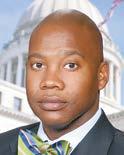
Address: P.O. Box 1626 Clarksdale, MS 38614
Coahoma Electric Power Association’s Annual Meeting of Members
Thursday, Feb. 9, 2023, at 10 a.m. Coahoma Electric’s Headquarters, Coahoma, MS
Coahoma Electric Power Association is an equal opportunity provider and employer. If you wish to file a Civil Rights program complaint of discrimination, complete the USDA Program Discrimination Complaint Form, found online at http://www.ascr.usda.gov/complaint_filing_cust.html, or at any USDA office, or call (866)632-9992 to request the form. You may also write a letter containing all of the information requested in the form. Send your completed complaint form or letter to us by mail at U.S. Department of Agriculture, Director, Office of Adjudication, 1400 Independence Avenue, S.W., Washington, D.C. 20250-9410, by fax (202) 690-7442 or email at program.intake@usda.gov.
Coahoma


A davit from all agricultural account holders. The A davit ensures that all accounts that are agricultural in nature are being taxed at the appropriate rate. The Mississippi Department of Revenue requires an A davit to be filed and maintained at the electric cooperative to verify compliance. The forms can be found in the web page of the Revenue Department at www.dor.ms.gov or at the Association’s o ce at 340 Hopson Street, Lyon, MS.


Representatives at 662-624-8321.





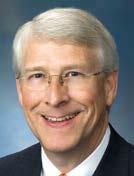

Last year saw a record increase in electric vehicle (EV) sales, and experts are predicting that by 2035, many major vehicle manufacturers will only produce electric models.





A 2021 study by the Department of Energy showed that increased electrification, or replacement of direct fossil fuel use with electricity, would account for a 38% increase in electricity demand by 2050 — and EVs will play a major role in this increased electrification.
Electric cooperatives are currently identifying ways to manage this new pattern of electricity use, though exact strategies will vary based on each utility’s unique needs. Analyzing energy load patterns or identifying where and when the local grid has spikes in demand can provide electric co-ops with data on where to place higher-capacity transformers. This analysis can also provide a picture of overall energy use and patterns to help forecast energy consumption for the future. Planning system maintenance and upgrades are also part of that long-range forecasting; however, this has been recently complicated by supply-chain issues with transformers, with wait times that are upwards of one year.


EV owners can play a role in reducing energy costs and system stress associated with charging. Check with your local electric co-op to see if they o er an EV charging rate. Typically, an EV rate incentivizes charging during the night, when electricity demand and wholesale energy rates are lower. Charging at night is also a great way to ease demand in your neighborhood, even without a special EV rate.
The need for more electricity will have a major impact on the nation’s grid, which means power supply and grid infrastructure must be carefully planned to accommodate the increased need for electricity.


EV charging presents new challenges in maintaining the electric grid. Fully charging an EV battery requires the same amount of electricity needed to power a home during peak energy use times. However, EV charging is a concentrated pull of energy over an extended period, which can add stress to the local power grid by increasing the amount of electricity a utility has to provide. Additionally, the neighborhood transformer needs adequate capacity to handle the increased load. EV charging can shorten the lifespan of transformers by straining and overloading their capacity if they are not matched to a neighborhood’s energy needs.
Another potential change on the horizon is a new energy peak time. EV drivers that plug-in to charge as soon as they return home from work would create even more electricity demand during this busy time of day. But if EV drivers use a timer to schedule charging at night, the electricity demand could be spread over a longer period to reduce stress on the grid. This would be especially beneficial for neighborhoods with multiple EV drivers.


EVs are only expected to increase in number. Electric co-ops and EV owners both have roles to play in accommodating increased demand. If you own an EV, let your electric co-op know so they can better plan energy demand for you and your neighbors.








Happy New Year! I hope 2023 will be a year that will bring us health and peace. While there will be challenges this year, my hope for you is that we turn them into opportunities for ourselves, our families and our communities. Those who know me know I am a positive person. I believe in viewing problems as opportunities and in finding solutions. Whatever challenges 2023 brings to the electric industry, the Coast Electric team will actively work to find solutions that make sense for the people we serve. I look forward to another year of progress for Coast Electric and for our high-speed internet subsidiary, CoastConnect. It’s a privilege to light your homes and businesses, and to connect you to reliable internet service.
Coast Electric wants you to reduce your energy use and see savings on your energy costs. Each month, you will have an opportunity to register to win a prize that will help you reduce the energy consumption in your home. All you have to do is visit www.coastepa.com and fill out our entry form. It only takes a few seconds, and you could win a prize that helps you save!












Higher prices for staples like groceries have a ected households across our service area and, unfortunately, the electric industry has not escaped the impacts of inflation. The cost of materials like poles and transformers has increased greatly over the past months, as has the cost of generating power. That means costs for our members will necessarily increase over the coming months. We will have more information in February, but members can expect an increase of between 4-6% on their monthly bills starting this March. Coast Electric will not profit from members’ increased costs. The cooperative, which is a not-for-profit organization, will only pass along increases to members to cover the cost of bringing electric service to homes and businesses in Hancock, Harrison and Pearl River counties.
Electric Power Association salutes Mississippi’s senators and representatives who represent our state in Washington, D.C., and at our state capitol in Jackson. We appreciate their dedication and willingness to serve in the spirit of public service to help shape the future of our state.














Rep.
Rep.
Rep.
Rep.
Rep.
Rep.
District

Years in Legislature: 12



















 Rep. Timmy Ladner
93: Hancock, Pearl River, and Stone counties
Jay McKnight District 95: Hancock and Harrison counties Years in Legislature: 4
Jansen Owen District 106: Lamar and Pearl River counties Years in Legislature: 4
Stacey Wilkes District 108: Pearl River County Years in Legislature: 7
Je rey S. Guice District 114: Harrison and Jackson counties Years in Legislature: 16
Randall Patterson District 115: Harrison County Years in Legislature: 20
Casey Eure District 116: Harrison County Years in Legislature: 13
Rep. Kevin W. Felsher District 117: Harrison County
Rep. Timmy Ladner
93: Hancock, Pearl River, and Stone counties
Jay McKnight District 95: Hancock and Harrison counties Years in Legislature: 4
Jansen Owen District 106: Lamar and Pearl River counties Years in Legislature: 4
Stacey Wilkes District 108: Pearl River County Years in Legislature: 7
Je rey S. Guice District 114: Harrison and Jackson counties Years in Legislature: 16
Randall Patterson District 115: Harrison County Years in Legislature: 20
Casey Eure District 116: Harrison County Years in Legislature: 13
Rep. Kevin W. Felsher District 117: Harrison County
Last month, representatives from charitable organizations in our community gathered to celebrate the things they were able to accomplish in 2022 with grants from Coast Electric’s Operation Round Up program. Operation Round Up uses the generous donations of members who round up their monthly bills to award grants to charitable organizations that are making a positive di erence in our community. With the last round of grant recipients, Operation Round Up surpassed $1 million in grants since they began being awarded in 2019. With this milestone, Operation Round Up and its donors have become one of the most philanthropic organizations in the area. We would like to wish our members A MILLION THANKS for their generosity and support of this program.
Pictured: In December, recipients of Operation Round Up grants gathered at Coast Electric’s Kiln Headquarters to celebrate the amazing work they do in our community. The Operation Round Up program has granted dozens of local charitable organizations more than $1 million since 2019. Some of those in attendance celebrating this milestone were representatives from Mississippi Gulf Coast Buddy Sports, The Arts of Hancock County, the University of Southern Mississippi Children’s Center for Communication and Development, the Hancock County Food Pantry and everyone’s favorite representative, Remi, the CASA of Hancock County therapy dog.
Lana Martin • Feeding the Gulf Coast
“Your donation is going to help us continue our mission of feeding children through the Backpack Blessings program.”

Angie Crawford • Rotary of Gulfport, Orange Grove


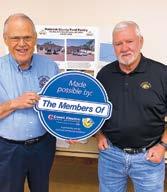
The Rotary Club of Gulfport, Orange Grove supports students in the Harrison County School District through programs like Backpack Buddies. Angie said before the grant, they supported 40 students, but with Operation Round Up grant funds, they will now support an additional 20 students. They were also able to up the number of students they helped through the Christmas for Kids program from between 50-60 to 100 students. Christmas for kids allows students to pick out clothes, school supplies and a Christmas gift.
Jeanette Ladner • Junior Auxiliary of Gulfport
“JA of Gulfport typically serves 16,000 children a year. This year, with the help of Operation Round Up, we were able to service 3,000 more children in the Project Hope program, which provides food, clothing and medical needs. We were also able to add another school to our Backpack Blessings program.”

Renee Davis • Gulf Coast Center for Nonviolence
“Our grant through Operation Round Up served a really important purpose by allowing us to fit our main shelter with a whole-house generator.” Renee explained that taking residents out of the shelter for storm evacuations exposes them to risk from their abusers. Allowing them to have a safe place to stay during storm events is crucial. “We are greatly appreciative for everything Coast Electric members have done.”






 by Paul Wesslund
by Paul Wesslund


Many of us are so connected to our phones, tablets and laptops that we panic when their battery nears the dreaded 0% mark. We want our device batteries to perform well for as long as possible. But taking care of them can conflict with why we have our electronics in the first place. The point isn’t to fret about battery life, it’s to read and send e-mails, scroll on social media, take photos, and countless other pursuits.
If you ever find yourself fretting over your device’s power levels, here are a few tips on striking the right balance between battery health and how you work and play.
Keep your battery about 40% to 80% charged.


There’s a lot of reasonable advice around the internet to keep your phone charged between 20% and 80%, or between 40% and 80%. To understand those recommendations — and why you might want to either follow them or ignore them — it helps to understand how rechargeable batteries work.
Up until about 20 years ago, batteries benefitted from occasional “deep discharges”—running the battery down until the device shuts off. But because of different materials used in batteries today, that’s not true anymore.



Rechargeable batteries work by containing two different materials that produce electricity when particles flow from one to the other. They flow the other direction when being recharged. That process will degrade any battery over time. Keeping both sides of the battery in balance, with the device charged at about 50%, will put the least amount of stress on the battery and make it last longer.
But that’s unrealistic — no one’s going to keep their phone half-charged all the time. So, the experts try to make it easier by recommending 40% to 80% or 20% to 80%.

Charging your device up to 100% or letting it drain to 0% until it shuts down does put extra stress on the battery and can shorten its life. That’s why it can make sense to charge your devices occasionally throughout the day rather than keeping them plugged in while you sleep.
Many of us are so connected to our phones, tablets and laptops that we panic when their battery nears the dreaded 0% mark.






One absolute in battery care is don’t let your device get warmer than 95 degrees. Keep it out of the sun, and never leave it in a hot vehicle. If the device does get hot, don’t go to the other extreme and put it in the freezer. Just place it in the shade or take the cover off for a while.
It sounds simple, but one of the easiest ways to put less stress on the battery is to use less power. You can close energy-draining apps and functions when you’re not using them, and you can activate energy-saving settings like putting the device to sleep sooner. Another easy way to reduce battery use is to activate the “airplane mode” button every now and then. You may be inconvenienced by a temporary pause on receiving e-mails or phone calls, but it might help you focus on that movie you’re watching, the trail you’re hiking, or the conversation with your dinner companions.

Rep. M. Kevin Horan
District 34: 1500 Gateway Grenada, MS 38901



Rep. Otis Anthony
District 31: P.O. Box 962 Indianola, MS 38751
Rep. Willie Bailey






District 49: P.O. Box 189 Greenville, MS 38702
Rep. John W. Hines Sr.
District 50: P.O. Box 114 Greenville, MS 38703
Rep. Bryant W. Clark
District 47: 271 Clark Road Pickens, MS 39146



Rep. Robert Sanders
District 29: P.O. Box 4088 Cleveland, MS 38732
Rep. Karl Oliver
District 46: P.O. Box 95 Winona, MS 38967
Rep. Jason White



District 48: P.O. Box 246 West, MS 39192
District 30: P.O. Box 236 Tutwiler, MS 38963

Sen. Sarita M. Simmons



District 13: P.O. Box 1813 Cleveland, MS 38732

Sen. Lydia Chassaniol

District 14: P.O. Box 211 Winona, MS 38967

Sen. Bart Williams

District 15: 901 Lynn Lane, Starkville, MS 39759
Sen. David L. Jordan
District 24: 504 Bowie Lane Greenwood, MS 38930








Sen. Joseph Thomas
District 22: 820 Prentiss Avenue, Yazoo City, MS 39194



Sen. Derrick T. Simmons


District 12: P.O. Box 1854 Greenville, MS 38072

Last year saw a record increase in electric vehicle (EV) sales, and experts are predicting that by 2035, many major vehicle manufacturers will only produce electric models.





A 2021 study by the Department of Energy showed that increased electrification, or replacement of direct fossil fuel use with electricity, would account for a 38% increase in electricity demand by 2050 — and EVs will play a major role in this increased electrification.
Electric cooperatives are currently identifying ways to manage this new pattern of electricity use, though exact strategies will vary based on each utility’s unique needs. Analyzing energy load patterns or identifying where and when the local grid has spikes in demand can provide electric co-ops with data on where to place higher-capacity transformers. This analysis can also provide a picture of overall energy use and patterns to help forecast energy consumption for the future. Planning system maintenance and upgrades are also part of that long-range forecasting; however, this has been recently complicated by supply-chain issues with transformers, with wait times that are upwards of one year.

EV owners can play a role in reducing energy costs and system stress associated with charging. Check with your local electric co-op to see if they o er an EV charging rate. Typically, an EV rate incentivizes charging during the night, when electricity demand and wholesale energy rates are lower. Charging at night is also a great way to ease demand in your neighborhood, even without a special EV rate.
The need for more electricity will have a major impact on the nation’s grid, which means power supply and grid infrastructure must be carefully planned to accommodate the increased need for electricity.




EV charging presents new challenges in maintaining the electric grid. Fully charging an EV battery requires the same amount of electricity needed to power a home during peak energy use times. However, EV charging is a concentrated pull of energy over an extended period, which can add stress to the local power grid by increasing the amount of electricity a utility has to provide. Additionally, the neighborhood transformer needs adequate capacity to handle the increased load. EV charging can shorten the lifespan of transformers by straining and overloading their capacity if they are not matched to a neighborhood’s energy needs.
Another potential change on the horizon is a new energy peak time. EV drivers that plug-in to charge as soon as they return home from work would create even more electricity demand during this busy time of day. But if EV drivers use a timer to schedule charging at night, the electricity demand could be spread over a longer period to reduce stress on the grid. This would be especially beneficial for neighborhoods with multiple EV drivers.


EVs are only expected to increase in number. Electric co-ops and EV owners both have roles to play in accommodating increased demand. If you own an EV, let your electric co-op know so they can better plan energy demand for you and your neighbors.





























As the calendar turns to a new year, many of us begin to contemplate resolutions. Those resolutions often begin with resolving to make changes in particular behaviors to see a desired outcome. This year, you may want to consider adding saving energy to your list of New Year’s resolutions.
One thing we can all agree on is high winter bills are never fun, especially in our current economic environment. You can begin the year saving energy by managing your home’s energy use and keeping your winter bills in check.

Mind the thermostat. This is one of the easiest ways to manage your home energy use. We recommend setting your thermostat to 68 degrees (or lower) when you’re home. When you’re sleeping or away for an extended period of time, try setting it between 58 and 62 degrees; there’s no need to heat your home when you’re away or sleeping and less active. If you have a manual thermostat, you might consider switching to a programmable thermostat, which will help improve the energy e ciency of your system.



Button up your home. The Department of Energy estimates that air leaks account for 24% to 40% of the energy used for heating and cooling a home. Caulking and weather stripping around windows and doors is another simple, cost-e ective way to increase comfort and save energy. If you can feel drafts while standing near a window or door, it likely needs to be sealed.
Use window coverings wisely. Open blinds, drapes or other window coverings during the day to allow natural sunlight in to warm your home. Close them at night to keep the cold, drafty air out. If you feel cold air around windows, consider hanging curtains or drapes in a thicker material; heavier window coverings can make a significant di erence in blocking cold outdoor air.





Avoid space heaters. While a good central heating system is designed to meet whole house needs, sometimes consumers turn to space heaters for additional warmth. Though small in size, space heaters can drive up the cost of your power bill tremendously. Space
heaters are intended to be used in small spaces for short periods of time. Never try to heat a room with a space heater, especially when central heat is available.
Think outside the box. If you’re still feeling chilly at home, think of other ways to warm up — beyond dialing up the thermostat. Add layers of clothing, wear thick socks, and bundle up under blankets. You can even add layers to your home! If you have hard-surface flooring, consider purchasing an area rug to block cold air that leaks in through the floor.
If you’re taking steps to save energy but continue to see major increases in your bills, give us a call at 601-425-2535. Dixie Electric’s energy experts can help identify areas and other factors impacting your home energy use and recommend next steps for savings. You can also visit our website at dixieepa.com for additional energy-saving tips.
Winter months often bring some of the highest energy bills of the year. But, by being proactive about saving energy, and resolving to make the necessary changes within your control, you can increase the comfort of your home and reduce monthly bills.

 by Randy Smith General Manager
by Randy Smith General Manager



Here are five tips to help increase your home’s energy e ciency this winter:
Dixie Electric Power Association salutes Mississippi’s senators and representatives who represent our state in Washington, D.C., and at our state capitol in Jackson. We appreciate their dedication and willingness to serve in the spirit of public service to help shape the future of our state.
1 2 3 4
for a job well done to all our representatives and senators who represent constituents residing in our service area.

ROGER WICKER



555 Dirksen Senate Office Building Washington, D.C. 20510
CINDY HYDE-SMITH

702 Hart Senate Office Building Washington, D.C. 20510
MICHAEL GUEST


Third District
450 Cannon House Office Building Washington, D.C. 20515
Fourth District 443 Cannon House Office Building Washington, D.C. 20515
TATE REEVES Governor DELBERT HOSEMANN Lieutenant Governor























 Sen. Chris McDaniel District 42: Forrest and Jones counties Address: 506 South Court St. Ellisville, MS 39437
Sen. Dennis DeBar, Jr. District 43: George, Greene, and Wayne counties Address: P.O. Box 1090 Leakesville, MS 39451
Rep. Robin Robinson District 88: Jasper and Jones counties Address: P.O. Box 1963 Laurel, MS 39441
Sen. Juan Barnett District 34: Forrest, Jasper, and Jones counties Address: P.O. Box 407 Heidelberg, MS 39439
Rep. Percy Watson District 103: Forrest County Address: P.O. Box 1767 Hattiesburg, MS 39401
Rep. Donnie Scoggin District 89: Jones County Address: 1203 Pine St. Ellisville, MS 39437
Rep. Shane Barnett District 86: Greene, Perry, and Wayne counties Address: P.O. Box 621 Waynesboro, MS 39367
Rep. Noah Sanford District 90: Covington, Je erson Davis, and Simpson counties Address: P.O. Box 1900 Collins, MS 39428
Rep. Larry Byrd District 104: Forrest County Address: 17 Byrd Rd. Petal, MS 39465
Rep. Omeria Scott District 80: Clarke, Jasper, and Jones counties Address: 615 East 19th St. Laurel, MS 39440
Sen. Chris Johnson District 45: Forrest and Perry counties Address: P.O. Box 18247 Hattiesburg, MS 39404
Rep. Dale Goodin District 105: George, Greene, and Perry counties Address: 72 Memorial Church Rd. Richton, MS 39476
Sen. Je Tate District 33: Clarke and Lauderdale counties Address: 169 Springhill Rd. Meridian, MS 39301
Rep. Mark K. Tullos District 79: Jasper and Smith counties Address: P.O. Box 505 Raleigh, MS 39153
Sen. Joey Fillingane District 41: Covington, Forrest, Je erson Davis, Lamar, and Smith counties Address: 8 Westbrook Dr. Sumrall, MS 39482
Sen. Chris McDaniel District 42: Forrest and Jones counties Address: 506 South Court St. Ellisville, MS 39437
Sen. Dennis DeBar, Jr. District 43: George, Greene, and Wayne counties Address: P.O. Box 1090 Leakesville, MS 39451
Rep. Robin Robinson District 88: Jasper and Jones counties Address: P.O. Box 1963 Laurel, MS 39441
Sen. Juan Barnett District 34: Forrest, Jasper, and Jones counties Address: P.O. Box 407 Heidelberg, MS 39439
Rep. Percy Watson District 103: Forrest County Address: P.O. Box 1767 Hattiesburg, MS 39401
Rep. Donnie Scoggin District 89: Jones County Address: 1203 Pine St. Ellisville, MS 39437
Rep. Shane Barnett District 86: Greene, Perry, and Wayne counties Address: P.O. Box 621 Waynesboro, MS 39367
Rep. Noah Sanford District 90: Covington, Je erson Davis, and Simpson counties Address: P.O. Box 1900 Collins, MS 39428
Rep. Larry Byrd District 104: Forrest County Address: 17 Byrd Rd. Petal, MS 39465
Rep. Omeria Scott District 80: Clarke, Jasper, and Jones counties Address: 615 East 19th St. Laurel, MS 39440
Sen. Chris Johnson District 45: Forrest and Perry counties Address: P.O. Box 18247 Hattiesburg, MS 39404
Rep. Dale Goodin District 105: George, Greene, and Perry counties Address: 72 Memorial Church Rd. Richton, MS 39476
Sen. Je Tate District 33: Clarke and Lauderdale counties Address: 169 Springhill Rd. Meridian, MS 39301
Rep. Mark K. Tullos District 79: Jasper and Smith counties Address: P.O. Box 505 Raleigh, MS 39153
Sen. Joey Fillingane District 41: Covington, Forrest, Je erson Davis, Lamar, and Smith counties Address: 8 Westbrook Dr. Sumrall, MS 39482
Electric cooperatives are guided by Seven Cooperative Principles. During Dixie Electric’s annual board elections, two of those principles worked together to benefit the community: Democratic Member Control and Concern for Community.
Each year, during the end of August through mid-October, Dixie Electric members have the opportunity to vote in their annual board elections. Because Dixie Electric is a cooperative, they are democratically controlled by their membership, allowing their members to vote on the candidate they believe will best serve the co-ops needs.
As an added incentive to increase voter participation, the Dixie Electric Board of Directors voted to donate $1 for every vote cast to be divided between three local food pantries in its area: Christian Food Mission in Laurel, Petal Children’s Task Force, and Samaritan’s Closet and Pantry in Waynesboro.
Due to another year of increased voting participation, Dixie Electric was able to present all three food pantries with a $1,900 donation to help feed those in need within the communities they serve during the holiday season.



Dixie Electric would like to thank its members who took the time to vote in the 2022 annual board elections, which also allowed them to continue their mission to be a catalyst for good within the community.
Diamond: Waynesboro, Chapparal, Cypress Creek, Shubuta Highway 588: Ellisville, Lowery Creek, Sandhill, Oak Bowery Macedonia: Macedonia, Sunrise, Barrontown, Union West Laurel: Ellisville, Calhoun, Soso, Moss, Shady Grove
West Moselle: Moselle, Oak Bowery, Pine Grove, Airport









As we begin 2023, it is a year with great promise. Barring any unforeseen roadblocks, we expect to complete the buildout of our high-speed fiber internet network as well as complete most of the services and home installations. Of course, we expect additional members will request services for years to come as more and more realize the full benefits of fiber-to-the-home internet service.
What an amazing accomplishment. When this project began, we expected it to take a minimum of five years to build over 3,800 miles of fiber and connect an expected 12,500 of our 37,500-member locations. Your support of this project has been humbling, and we greatly appreciate all our subscribers and the encouragement o ered.

As we began, many told us it would never pay and was too expensive to bring high-speed internet service to the rural areas. What sets us apart is that we are not doing this as a profitbased business. We pursued this monumental project to change communities and lives for the better. We want East Mississippi Electric Power Association members to have access to better educational opportunities, telemedicine, and the ability to work from home. We want businesses to have access to the best communication opportunities and the ability to compete globally.
Obstacles still come up almost daily. Gaining highway and railroad permits can be slow, supply chains are slow and governmental processes take time, but we have managed to navigate all of these. Even the prospective additional funding by the federal government


presents challenges. The rules are being developed slowly, and we are told if we pause our project in unserved areas until the rules are finalized, there “may” be more funding in the future.




We will not slow the process and we will not stop building because you deserve to have these services as soon as possible. More grants or not, we can and must continue to make high-speed internet available to all EMEPA members. We continue to encourage and pursue potential grant funds to o set the debt on completed projects in unserved areas. This would benefit generations for years to come.
Ultimately, you are the ones that make this a successful project. As long as you continue to subscribe to East Mississippi Connect services and support our e orts, our communities will remain strong and locally controlled.
Again, thanks for your support and trust in EMEPA and East Mississippi Connect as we build pathways for community success and work to empower lives.
 CEO — East Mississippi Electric Power Association
CEO — East Mississippi Electric Power Association
East Mississippi Electric Power Association salutes Mississippi’s senators and representatives who represent our state in Washington, D.C., and at our state capitol in Jackson. We appreciate their dedication and willingness to serve in the spirit of public service to help shape the future of our state.




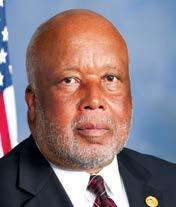


for a job well done to all our representatives and senators who represent constituents residing in our service area.
 CINDY HYDE-SMITH United States Senator
ROGER WICKER United States Senator
BENNIE G. THOMPSON Second District
TRENT KELLY
First District
MIKE EZELL Fourth District
MICHAEL GUEST Third District
CINDY HYDE-SMITH United States Senator
ROGER WICKER United States Senator
BENNIE G. THOMPSON Second District
TRENT KELLY
First District
MIKE EZELL Fourth District
MICHAEL GUEST Third District


















The Magnolia Electric Power Board of Directors has announced that the cooperative has recently retired $2,661,780 in Capital Credits to its members.
Capita Credit checks were put in the mail in early December; therefore, MEP’s eligible members should have received their Capital Credit checks by now.









“Capital Credits represent the amount remaining after all operating, maintenance, and general expenses are deducted from the total amount members paid on their electric bill during the fiscal year,” said General Manager Darrell Smith. “It is the member’s investment in the association’s physical plant including poles, substations, and other equipment.
“Capital Credits are allocated to members each year based on power use, and the amount of your capital credit check is a percentage of these allocations,” he said. “We are proud to be able to return these capital credits to our members,” Smith added.


























Capital Credits are one of the things that separate a not-for-profit electric cooperative, like Magnolia Electric Power, from investor-owned electric utilities, explained Smith.

There is an updated list on the MEP website at MEPCoop.com of older Capital Credits that MEP has been unable to return due to incorrect member addresses. Please be sure to check the list to see if your or a family member’s







If you have not received your Capital Credits or should find your name/a family name on the website list, please contact the o ce at 601-684-4011. Since 1960, MEP has returned a total of $57,141,461 in Capital Credits to







Magnolia Electric Power was established in 1938. The cooperative employs 100 full-time employees, maintains over 4,964 miles of power lines, and serves






closed on Monday, Jan. 16, 2023, for


In observance of MLK Day, MEP has joined with Cooperative Energy and will be participating in their Cooperative Day of Service. Employees of MEP will be holding a food drive through Friday, Jan. 20, 2023, as part of the observance. The food collected will help to restock local food pantries. If any MEP member would like to make a donation, please drop your food item o at the o ce.
In case of an outage or an emergency, a dispatcher will be on duty and linemen will be on call.








Magnolia Electric Power salutes Mississippi’s senators and representatives who represent our state in Washington, D.C., and at our state capitol in Jackson. We appreciate their dedication and willingness to serve in the spirit of public service to help shape the future of our state.

1
for a job well done to all our representatives and senators who represent constituents residing in our service area.



555 Dirksen Senate Office Building Washington, D.C. 20510
CINDY HYDE-SMITH

702 Hart Senate Office Building Washington, D.C. 20510
Third District
450 Cannon House Office Building Washington, D.C. 20515
TATE REEVES Governor DELBERT HOSEMANN Lieutenant Governor ROGER WICKER MICHAEL GUESTAdams, Amite, Franklin, and Pike counties
Address: Rd., Natchez, MS 39120


Adams, Amite, Pike, Walthall, and Wilkinson counties


Rep. Vince
District 53: Franklin, Jefferson Davis, Lawrence, Lincoln, and Pike counties
Address: P.O. Box 1018 Jackson, MS 39215 Years in Legislature: 8
Rep. Sam C. Mims V
District 97: Adams, Amite, Franklin, and Pike counties
Address: P.O. Box 1018 Jackson, MS 39215 Years in Legislature: 20

Address: 2018 Hawthorne Dr. McComb, MS 39648
Rep. Beckie Currie District 92: Copiah, Lawrence, and Lincoln counties





Address: 407 Oliver Dr. Brookhaven, MS 39601 Years in Legislature: 16

Rep. Daryl L. Porter Jr. District 98: Pike and Walthall counties Address: P.O. Box 772 Summit, MS 39666 Years in Legislature: 4


Copiah, Lawrence, Lincoln, and Walthall counties
Address: P.O. Box 729 Brookhaven, MS 39602


District 96: Adams, Amite, Pike, and Wilkinson counties
Address: P.O. Box 613 Magnolia, MS 39652 Years in Legislature: 18


Rep. Bill Pigott



District 99: Lamar, Marion, and Walthall counties
Address: 92 Pigott Easterling Rd. Tylertown, MS 39667 Years in Legislature: 16
For the purposes of electing directors, hearing and passing upon reports covering the previous fiscal year, and transacting such other business, the Annual Meeting of the members of Magnolia Electric Power shall be held in March each year, at such place in one of the counties of Mississippi within which the Association serves. At each Annual Meeting of the members, approximately one-third (1/3) of the total number of directors shall be elected by ballot, by and from the members, to serve for a term of three (3) years as provided by law.
By-Laws Governing the Association: Article IV, Section 4.04. (a) Committee on Nominations. It shall be the duty of the Board to appoint, no less than sixty (60) calendar days nor more than one hundred and twenty (120) calendar days before the date of the meeting of the members at which directors are to be elected, a committee on nominations from each district from which a director is to be elected, consisting of not less than 3 nor more than 5 members who shall be selected from di erent sections of the district so as to insure equitable geographic representation. No existing Association employee, agents, o cers, directors or known candidates for director, and close relatives (as hereinafter defined) or members of the same household of existing association employees, agents, o cers, directors or know candidates for director may serve on such committees. The committees shall receive and consider any written suggestion as to nominees submitted by members of the Association. The committee shall prepare and post at the principal o ce of the Association at least fifty (50) calendar days before the meeting a list of nominations for board members.
(b) Nominations by Petition. Any fifty (50) members acting together may make other nominations by petition and the Secretary shall post at least fifty (50) calendar days before the meeting such nominations at the same place where the list of nominations by the committees are posted. Any petition for nomination shall be submitted on a form designated and provided by the Association. Each member signing such petition shall place thereon the date of signing, address, and account number of the member. The Secretary shall mail with the notice of the meeting or separately a statement of the number of board members to be elected and the names of candidates nominated by the committees and the names of candidates nominated by petition, if any.
Article IV, Section 4.03. Director Qualifications
(Summarized)
1. Active member in good standing of the Association.
2. Bona fide resident of the district from which they are to be elected or must be a permanent and year-round resident within or in close proximity to an area served by the Association that no more than one (1) such
person may serve on the Board of Directors at the same time as set out in Section 4.03(e).
3. Must not be employed by or financially interested in a competing enterprise.
4. Must not have been finally convicted of a felony or misdemeanor involving moral turpitude.
5. Must not be a relative to the third degree by blood or marriage as defined in Section 4.08 of an employee, incumbent director, or the director being replaced.
6. No person shall take or hold o ce as a director who is the incumbent of or a candidate for any elective public o ce.
7. When a membership is held jointly by a married couple, either one, but not both, may be elected a director.
8. No person shall be eligible to become or remain a director of, or to hold any other position in trust in the Association who does not have the legal capacity to enter into a binding contract.
Article III, Section 3.05. Voting. Each member who is not in a status of suspension as provided for in Section 2.01, shall be entitled to only one vote upon each matter submitted to a vote at any meeting of the members at which a quorum is present. A member may vote in person or by proxy. At a meeting of the members where directors are to be elected, all members present in person or by proxy may cast one vote for each director to be elected; each member may vote their own vote plus those proxies executed in their favor, pursuant to Section 3.07 of these bylaws. Voting by members other than members who are natural persons shall be allowed upon the presentation to the Association, prior to or upon registration at each member, of satisfactory evidence entitling the person presenting same to vote. At all meetings of the members all questions shall be decided by a majority of the members voting thereon, except as otherwise provided by law or by the Association’s Certificate of Incorporation or these bylaws. Members may not cumulate their votes.
Article III, Section 3.06. Proxies. At all meetings of the members, a member may vote by proxy executed in writing by the member, subject to the provisions hereinafter set forth, provided, however, any member holding and intending to vote a proxy must file the executed proxy at the Association’s headquarters, not less than five (5) business days prior to the meeting. The proxy must have entered thereon the account number of the member appointed to vote the proxy. If one person shall receive electric service through two (2) or more meters at di erent premises, he or she shall be entitled to not more than one (1) vote at any meeting of the members. No proxy shall be voted at any meeting
This is a preliminary notice of the Annual Meeting of Magnolia Electric Power to be held March 30, 2023, at the Auditorium at Magnolia Electric Power headquarters, which is located at 3027 Highway 98 West, Summit, in Pike County, Mississippi.
At that meeting, directors from Districts one, four, and nine are to be elected to three-year terms.
District one is “all that portion of the certificated area of the Cooperative which lies south of Mississippi State Highway No. 24 and west of the east boundary line of Amite County, all being in Amite County, Mississippi.”
District four includes “all that portion of the certificated area of the Cooperative (a) situated in Lawrence County which lies north and west of a line beginning at the Northwest corner of Section 18, Township 6 North, Range 10 East, run thence east two miles, thence north to north boundary line of Lawrence County, and (b) situated in Lincoln County and is north and east of a line beginning at the northeast corner of Section 13, Township 6 North, Range 9 East, Lincoln County, Mississippi, run thence west to the northwest corner
of the members unless it shall designate the particular meeting at which it is to be voted, and no proxy shall be voted at any meeting other than the one so designated or any adjournment of such meeting. No proxy shall be voted by anyone except a member. No more than ten (10) proxies may be assigned to other members. No restriction shall apply to the number of proxies assigned to the Board of Directors who shall vote the proxies assigned to them according to the will of the majority of the members of the Board of Directors. The presence of a member at a meeting of the members shall revoke a proxy theretofore executed by that member, and such member shall be entitled to vote at such meeting in the same manner and with the same e ect as if the proxy had not been executed. In case of a joint membership, a proxy may be executed by either spouse. The timely presence of either spouse at a meeting of the members shall revoke a proxy theretofore executed by (either of) them and such joint member or members shall be entitled to vote at such meeting in the same manner and with the same e ect as if a proxy had not been executed. A standard proxy form shall be used which identifies the member by name and account number, in order to assure authenticity and facilitate the tabulation of votes. If the proxy form of a member is lost, stolen, or destroyed, the Association shall furnish the member with a replacement proxy form upon request, provided that the member executes a revocation of the lost, stolen or destroyed form, to be witnessed by an employee of the Association. Blank proxy forms will not be distributed in bulk to any member. Only the proxy form issued by the Association shall be valid.
Article III, Section 3.07. Representative Voting. Legal entity organizations and nonlegal entity organizations which are members of the Association may be represented at any meeting of the members and may vote only as follows: (a) any director, o cer or general manager may represent and cast the one vote of a corporation; (b) a trustee, steward, deacon, clerk, or pastor may represent and cast the one vote of a church; (c) a school trustee, principal or superintendent may represent and cast the one vote of a school; (d) or any other association or organization not a legal entity may be represented by and have its one vote cast by any person who is a trustee, or manager or part owner, or any o cer of such association or organization.
A complete set of bylaws is available at the association’s headquarters upon request.
You will receive o cial notice of the 2023 Annual Meeting in the mail at a later date.
of Section 18 of Township 6 North, Range 7 East, and run thence north to the north boundary line of Lincoln County, being partly in Lincoln County and partly in Lawrence County, Mississippi.”
District nine is described as “all that portion of the certificated area of the Cooperative which lies within Walthall and Marion counties, Mississippi, and is located south of the U. S. Highway No. 98, all being in Walthall and Marion counties, Mississippi.”
In connection with the election of directors scheduled for the meeting, the following members have been appointed by the Association’s board, pursuant to Association bylaws, as members of the Nominating Committee:
District One
Gary Austin
Eddie Lee Bates
Jimmy Burns
Gerald Wall
Dalton Williams, Jr.
District Four
Kim Haley
Laverne Jackson
Robbie Jackson
Tommy Owens
Harold Rutland
District Nine
Jewell Holmes
Bonnie Kirkpatrick
Carrie Lewis
Robert Shivers
Ted Smith




Many of us are so connected to our phones, tablets and laptops that we panic when their battery nears the dreaded 0% mark. We want our device batteries to perform well for as long as possible. But taking care of them can conflict with why we have our electronics in the first place. The point isn’t to fret about battery life, it’s to read and send e-mails, scroll on social media, take photos, and countless other pursuits.
If you ever find yourself fretting over your device’s power levels, here are a few tips on striking the right balance between battery health and how you work and play.
Keep your battery about 40% to 80% charged.

There’s a lot of reasonable advice around the internet to keep your phone charged between 20% and 80%, or between 40% and 80%. To understand those recommendations — and why you might want to either follow them or ignore them — it helps to understand how rechargeable batteries work.
Up until about 20 years ago, batteries benefitted from occasional “deep discharges”—running the battery down until the device shuts off. But because of different materials used in batteries today, that’s not true anymore.
Rechargeable batteries work by containing two different materials that produce electricity when particles flow from one to the other. They flow the other direction when being recharged. That process will degrade any battery over time. Keeping both sides of the battery in balance, with the device charged at about 50%, will put the least amount of stress on the battery and make it last longer.
But that’s unrealistic — no one’s going to keep their phone half-charged all the time. So, the experts try to make it easier by recommending 40% to 80% or 20% to 80%.
Overnight charging can add stress to some batteries.
Charging your device up to 100% or letting it drain to 0% until it shuts down does put extra stress on the battery and can shorten its life. That’s why it can make sense to charge your devices occasionally throughout the day rather than keeping them plugged in while you sleep.

Many of us are so connected to our phones, tablets and laptops that we panic when their battery nears the dreaded 0% mark.





One absolute in battery care is don’t let your device get warmer than 95 degrees. Keep it out of the sun, and never leave it in a hot vehicle. If the device does get hot, don’t go to the other extreme and put it in the freezer. Just place it in the shade or take the cover off for a while.

It sounds simple, but one of the easiest ways to put less stress on the battery is to use less power. You can close energy-draining apps and functions when you’re not using them, and you can activate energy-saving settings like putting the device to sleep sooner. Another easy way to reduce battery use is to activate the “airplane mode” button every now and then. You may be inconvenienced by a temporary pause on receiving e-mails or phone calls, but it might help you focus on that movie you’re watching, the trail you’re hiking, or the conversation with your dinner companions.

Monroe County Electric Power Association salutes Mississippi’s senators and representatives who represent our state in Washington, D.C., and at our state capitol in Jackson. We appreciate their dedication and willingness to serve in the spirit of public service to help shape the future of our state.

1 2 3 4
for a job well done to all our representatives and senators who represent constituents residing in our service area.
ROGER WICKER


555 Dirksen Senate Office Building Washington, D.C. 20510
CINDY HYDE-SMITH

702 Hart Senate Office Building Washington, D.C. 20510
First District 2243 Rayburn House Office Building Washington, D.C. 20515


Third District 450 Cannon House Office Building Washington, D.C. 20515
 TATE REEVES Governor DELBERT HOSEMANN Lieutenant Governor
TATE REEVES Governor DELBERT HOSEMANN Lieutenant Governor
Sen. Hob Bryan District 7 Itawamba, Lee, and Monroe counties
Address P.O. Box 75, Amory, MS 38821



Sen. Charles A. (Chuck) Younger District 17: Lowndes and Monroe counties







Rep. Chris Brown District 20 Itawamba, Lee, and Monroe counties
Address 33112 Hwy 45 N., Nettleton, MS 38858
Rep. Donnie Bell District 21 Itawamba and Tishomingo counties

Address 836 Tucker Rd., Fulton, MS 38843
Address 1213 Younger Rd., Columbus, MS 39701 A
Rep. Karl Gibbs District 36 Clay and Monroe counties

Address 5543 George Walker Rd., West Point, MS 39773
Rep. Dana McLean District 39 Lowndes and Monroe counties

Address 332 Williamsburg Rd., Columbus, MS 39705
The Electric Cooperatives of Mississippi o ers an easy-to-use mobile app of Mississippi’s state and federal elected o cials. Look for “Mississippi Legislative Roster” in the Apple App Store. An Android version is also available through Google Play.



Last year saw a record increase in electric vehicle (EV) sales, and experts are predicting that by 2035, many major vehicle manufacturers will only produce electric models.





A 2021 study by the Department of Energy showed that increased electrification, or replacement of direct fossil fuel use with electricity, would account for a 38% increase in electricity demand by 2050 — and EVs will play a major role in this increased electrification.
Electric cooperatives are currently identifying ways to manage this new pattern of electricity use, though exact strategies will vary based on each utility’s unique needs. Analyzing energy load patterns or identifying where and when the local grid has spikes in demand can provide electric co-ops with data on where to place higher-capacity transformers. This analysis can also provide a picture of overall energy use and patterns to help forecast energy consumption for the future. Planning system maintenance and upgrades are also part of that long-range forecasting; however, this has been recently complicated by supply-chain issues with transformers, with wait times that are upwards of one year.


EV owners can play a role in reducing energy costs and system stress associated with charging. Check with your local electric co-op to see if they o er an EV charging rate. Typically, an EV rate incentivizes charging during the night, when electricity demand and wholesale energy rates are lower. Charging at night is also a great way to ease demand in your neighborhood, even without a special EV rate.
The need for more electricity will have a major impact on the nation’s grid, which means power supply and grid infrastructure must be carefully planned to accommodate the increased need for electricity.


EV charging presents new challenges in maintaining the electric grid. Fully charging an EV battery requires the same amount of electricity needed to power a home during peak energy use times. However, EV charging is a concentrated pull of energy over an extended period, which can add stress to the local power grid by increasing the amount of electricity a utility has to provide. Additionally, the neighborhood transformer needs adequate capacity to handle the increased load. EV charging can shorten the lifespan of transformers by straining and overloading their capacity if they are not matched to a neighborhood’s energy needs.
Another potential change on the horizon is a new energy peak time. EV drivers that plug-in to charge as soon as they return home from work would create even more electricity demand during this busy time of day. But if EV drivers use a timer to schedule charging at night, the electricity demand could be spread over a longer period to reduce stress on the grid. This would be especially beneficial for neighborhoods with multiple EV drivers.


EVs are only expected to increase in number. Electric co-ops and EV owners both have roles to play in accommodating increased demand. If you own an EV, let your electric co-op know so they can better plan energy demand for you and your neighbors.





North East Mississippi Electric Power Association’s Annual Meeting was held in person on Dec. 10, 2022, at 1 p.m. in the NEMEPA Auditorium. The meeting covered topics such as an update on the association and NE SPARC, the financial report, and board elections. North East was excited to return to an in-person format and welcome our members back to the Annual Meeting.
If you missed the Annual Meeting in person, you can still watch it online at www.nemepa.org.

O cial ballots were mailed and at NEMEPA’s Annual Meeting, three of the cooperative’s directors were reelected to the board. Mickey Clayton of Etta (District 2), John Davis of Oxford (District 4), and James Herod of Abbeville (District 7) will continue to serve as directors.
Members who attended the Annual Meeting in-person were eligible for prizes, as well as those that sent in their mail-in ballots or turned in a proxy. Prize winners from voting in the election were randomly selected by our accounting firm, Franks Franks Wilemon and Hagood.

The winners of the mail-in ballots were as follows:
Stevi M. Self • 55” TV


Timothy Williams

$500 NEMEPA/SPARC Bucks
Lynne McIngvale
$250 NEMEPA/SPARC Bucks
R. L. Kitchens

$250 NEMEPA/SPARC Bucks
Juelene White
$100 NEMEPA/SPARC Bucks
Mary Nowlin
$100 NEMEPA/SPARC Bucks
Mildred Egerson
$100 NEMEPA/SPARC Bucks
The winners of those who turned in a proxy were as follows:





Martha Davis • 55” TV
Kara Cook
$500 NEMEPA/SPARC Bucks
Douglas Ferris $250 NEMEPA/SPARC Bucks
Joseph Conlee
$250 NEMEPA/SPARC Bucks
Ramona Bullock
$100 NEMEPA/SPARC Bucks
Ryan David Wroniak
$100 NEMEPA/SPARC Bucks
Barbara Floyd $100 NEMEPA/SPARC Bucks
The winners who attended the Annual Meeting were as follows:
Ruthie Vaughn • 55” TV
Albert Hill
$500 NEMEPA/SPARC Bucks
James Millner
$250 NEMEPA/SPARC Bucks
Joe McBride
$250 NEMEPA/SPARC Bucks
Roy Williams

$100 NEMEPA/SPARC Bucks
Steve Crowe $100 NEMEPA/SPARC Bucks


























East Mississippi Electric Power Association hosted our first Cooperative University on Nov. 2. High school juniors from four local high schools attended the event to learn about cooperatives, the electric power industry, and to expand on their leadership skills.
During the morning session, students heard from General Manager and CEO Keith Hayward and expanded their knowledge about their local cooperative and the seven cooperative principles. They also explored leadership with Member Services Manager Marlin Williams and participated in fun team building exercises to put their skills into action.
From there, students learned about the Tennessee Valley Authority and how power is generated, transmitted, and distributed to members of NEMEPA. TVA also provided hands-on demonstrations to reinforce what they were taught.


Finally, the students gained appreciation for our linemen by learning what happens when there is a power outage and why safety is a top priority to us. They also got to try some of the skills our lineman use every day.
From this group, judges selected students to represent North East Power for the Cooperative Youth Leadership Program. Those selected will attend a leadership workshop in Jackson in March and an educational tour of Washington, D.C. in June.























North East Mississippi Electric Power Association salutes Mississippi’s senators and representatives who represent our members at the state capitol in Jackson. We appreciate their dedication and willingness to serve in the spirit of public service to help shape the future of our state.

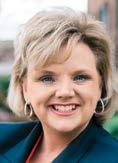




a job well done to all our representatives and senators who represent constituents residing in our service area.















Once again, I failed to watch the old year leave and usher in the new. I had faith it would happen without me. After all, 2021 was a year with significant improvement over 2020. I have faith that 2023 will be an improvement over the last year as well.
Northcentral Connect, our high-speed internet a liate, has had a slow but steady deployment. As we set our eye on 3,000 subscribers, we are working strategically on ways to speed up supply chain and labor issues. Our community deserves a ordable, reliable, high-speed internet service to enhance the quality of life in our area. 3,000 isn’t that bad, but we hope to see that number double in the next year.

Distribution plan upgrades continue as we see robust residential and large-scale commercial growth throughout our system. This increased investment not only provides power to our new consumers but also provides greater reliability for our existing members in the community.
Planning for the unplanned is continuous. We’d prefer to not see an ice storm like we did in February of last year but realizing the threat will have us better positioned to o er even quicker restoration times than we saw then. High-speed


internet and servicing growth is important, but, at the end of the day, maintaining quality electric service in the community remains a priority.

Don’t confuse me with a futurist, but I am an optimist. The new year will be an improvement over 2022 in many areas. We at Northcentral will reflect on the past two years and take it as an opportunity to excel. I love the quote from the movie “Forrest Gump,” “Don’t you just love New Year’s? You get to start all over.” We don’t require a “start over” at Northcentral. Instead, we look forward to an energized REstart moving into 2023.
Happy New Year.

Happy Birthday Elvis. Stay safe.
 by Kevin Doddridge General Manager/CEO
by Kevin Doddridge General Manager/CEO







































 Rep. Steve Massengill District 13: Benton, Lafayette, Marshall, and Union counties Years in Legislature: 12
Rep. Steve Hopkins District 7: DeSoto County Years in Legislature: 8
Rep. Dan Eubanks District 25: DeSoto County Years in Legislature: 8
Rep. Jeff Hale District 24: DeSoto County Years in Legislature: 8
Rep. John T. (Trey) Lamar III District 8: Lafayette and Tate counties Years in Legislature: 12
Rep. Dana Criswell District 6: DeSoto County Years in Legislature: 8
Rep. John Faulkner District 5: Benton, Lafayette, Marshall, and Tate counties Years in Legislature: 11
Rep. Jerry Darnell District 28: DeSoto County Years in Legislature: 4
Rep. Steve Massengill District 13: Benton, Lafayette, Marshall, and Union counties Years in Legislature: 12
Rep. Steve Hopkins District 7: DeSoto County Years in Legislature: 8
Rep. Dan Eubanks District 25: DeSoto County Years in Legislature: 8
Rep. Jeff Hale District 24: DeSoto County Years in Legislature: 8
Rep. John T. (Trey) Lamar III District 8: Lafayette and Tate counties Years in Legislature: 12
Rep. Dana Criswell District 6: DeSoto County Years in Legislature: 8
Rep. John Faulkner District 5: Benton, Lafayette, Marshall, and Tate counties Years in Legislature: 11
Rep. Jerry Darnell District 28: DeSoto County Years in Legislature: 4
At Northcentral’s Annual Meeting of the Members on Oct. 26, Kimberly Gordon was elected to the Board of Directors for the cooperative. Gordon will serve the members of District 7, which covers southern Marshall County and portions of Tate and Lafayette Counties.
A resident of Tate County, Gordon has been a self-employed hairdresser for over 30 years. She is also a forklift operator with FedEx Freight, where she has been employed for 10 years.
Gordon and her husband Randy have four daughters. In addition to spending time with their 10 grandchildren, they enjoy fishing and camping.
When asked about her motivation to vie for the open board seat, Gordon said, “I have always been interested in the industry. My husband’s grandfather retired from the Tennessee Valley Authority and worked in Batesville during his career. After praying about the opportunity, I am excited to serve and eager to learn as much as I can about the industry.”
It is said that every decision in the electric cooperative world is made with the member at the end of the line in mind. With Kimberly Gordon living at the southernmost part of the Northcentral service area, you can take comfort in knowing that, in fact, a member “at the end of the line” is helping to make those decisions.

After 18 years of service to the members of Northcentral Electric Cooperative, Joan Childress resigned her position on the Board of Directors when she relocated from rural Marshall County to Southaven.


Childress was elected to the board in August 2004, to represent members of District 7, which covers southern Marshall County and portions of Tate and Lafayette Counties. In her service she brought nearly 30 years of expertise in information technology working for FedEx, where she provided technical support to their marketing, accounting, and legal departments before retiring in 2015.
During her time on the board, Childress helped guide the cooperative through many changes and rapid growth, including the consolidation and relocation of Northcentral facilities to a newly constructed campus in Olive Branch. She was also instrumental in the decision to form our fiber internet subsidiary, Northcentral Connect. The decision to move operations to Olive Branch was a di cult one. “At the time, I didn’t like the idea of leaving Byhalia. In the end, it was a good decision seeing how fast the cooperative and the service area was growing,” said Childress.
When asked about her thoughts on her time on the board, Childress spoke fondly of the cooperative’s leadership and employees. “Everyone works so well together to serve the members. Leadership has great engagement with employees, and the board has always gotten along to reach a common goal. We always voted how we felt but supported one another even when we disagreed.”
In retirement, Childress gives her time volunteering with Hearts and Hands Ministries in Byhalia and will soon begin volunteer work with the DeSoto County Dream Center. She now intends to “enjoy life more,” which consists of traveling, playing piano, and most importantly spending time with her grandchildren.
At the cooperative’s Annual Meeting of the Members on Oct. 26, Attorney James Woods read a board resolution thanking Childress for her years of dedicated service to Northcentral Electric Cooperative.
Joan Childress Kimberly GordonLast year saw a record increase in electric vehicle (EV) sales, and experts are predicting that by 2035, many major vehicle manufacturers will only produce electric models.





A 2021 study by the Department of Energy showed that increased electrification, or replacement of direct fossil fuel use with electricity, would account for a 38% increase in electricity demand by 2050 — and EVs will play a major role in this increased electrification.
Electric cooperatives are currently identifying ways to manage this new pattern of electricity use, though exact strategies will vary based on each utility’s unique needs. Analyzing energy load patterns or identifying where and when the local grid has spikes in demand can provide electric co-ops with data on where to place higher-capacity transformers. This analysis can also provide a picture of overall energy use and patterns to help forecast energy consumption for the future. Planning system maintenance and upgrades are also part of that long-range forecasting; however, this has been recently complicated by supply-chain issues with transformers, with wait times that are upwards of one year.

EV owners can play a role in reducing energy costs and system stress associated with charging. Check with your local electric co-op to see if they o er an EV charging rate. Typically, an EV rate incentivizes charging during the night, when electricity demand and wholesale energy rates are lower. Charging at night is also a great way to ease demand in your neighborhood, even without a special EV rate.
The need for more electricity will have a major impact on the nation’s grid, which means power supply and grid infrastructure must be carefully planned to accommodate the increased need for electricity.



EV charging presents new challenges in maintaining the electric grid. Fully charging an EV battery requires the same amount of electricity needed to power a home during peak energy use times. However, EV charging is a concentrated pull of energy over an extended period, which can add stress to the local power grid by increasing the amount of electricity a utility has to provide. Additionally, the neighborhood transformer needs adequate capacity to handle the increased load. EV charging can shorten the lifespan of transformers by straining and overloading their capacity if they are not matched to a neighborhood’s energy needs.
Another potential change on the horizon is a new energy peak time. EV drivers that plug-in to charge as soon as they return home from work would create even more electricity demand during this busy time of day. But if EV drivers use a timer to schedule charging at night, the electricity demand could be spread over a longer period to reduce stress on the grid. This would be especially beneficial for neighborhoods with multiple EV drivers.


EVs are only expected to increase in number. Electric co-ops and EV owners both have roles to play in accommodating increased demand. If you own an EV, let your electric co-op know so they can better plan energy demand for you and your neighbors.



One of our goals at Pearl River Valley Electric is to provide members with information about using energy wisely. When building or remodeling a home, energy e ciency should be a high priority. For more than twenty years our Comfort Advantage new home program has helped members save money on their monthly bills and increase the resale values of their homes.


Comfort Advantage energy-e ciency standards are based on years of experience, and they are continually being updated. The program now o ers the following incentives for new homes:




• Comfort Advantage homes qualify for up to 150 feet of free underground service.


• Comfort Advantage Plus homes qualify for up to 150 feet of free underground service and a rebate of $500.
• Geothermal heat pump installations qualify for an additional $500 rebate.






For existing homes, upgrading from an electric furnace or an old ine cient central air conditioner to a 14 SEER or higher heat pump qualifies for a rebate of $400.
The Comfort Advantage program can help make your energy decisions a breeze. We also o er free building consultations and HVAC load calculations. For more information contact Trey Ware, energy services advisor, at 601-731-7831.
of .60 or less and a solar heat gain coe cient (SHGC) of .60 or less. 6. AIR SEALING - Air sealing must be applied to all penetrations through exterior walls and to holes into attics or crawlspaces. Apply sill insulation between the slab and bottom plate. Properly install housewrap or building paper to cover exterior sheathing in wood framed homes. Inside the home, apply appropriate caulk or gaskets to electrical boxes, and seal around plumbing penetrations.





The Mississippi Legislature convenes in January for the 2023 session.

Pearl River Valley Electric Power Association salutes Mississippi’s senators and representatives who represent our members at our state capitol in Jackson. We appreciate their dedication and willingness to serve in the spirit of public service to help shape the future of our state.
Sen. Jason Barrett


District 39: Copiah, Lawrence, Lincoln, and Walthall counties
Address: P.O. Box 729 Brookhaven, MS 39602
Sen. Dennis DeBar, Jr.


District 43: George, Greene, and Wayne counties
Address: P.O. Box 1090 Leakesville, MS 39451
District 41: Covington, Forrest, Je erson Davis, Lamar, and Smith counties

Address: 8 Westbrook Dr. Sumrall, MS 39482


District 40: Marion and Pearl River counties
Address: 54 Watts Rd. Picayune, MS 39466

District 45: Forrest and Perry counties
Address: P.O. Box 18247 Hattiesburg, MS 39404
Sen. John A. Polk
District 44: Lamar and Pearl River counties
Address: 53 Tidewater Rd. Hattiesburg, MS 39402
Sen. Joseph M. “Mike” Seymour

District 47: Jackson, Pearl River, and Stone counties
Address: 15417 Indian Fork Rd. Vancleave, MS 39565

District 104: Forrest County

Address: 17 Byrd Rd. Petal, MS 39465
District 91: Copiah, Covington, Je erson Davis, Lawrence, and Simpson counties
Address: P.O. Box 636 Monticello, MS 39654
District 105: George, Greene, and Perry counties
Address: 72 Memorial Church Rd., Richton, MS 39476

District 93: Hancock, Pearl River, and Stone counties

Address: P.O. Box 1018 Jackson, MS 39215
District 53: Franklin, Je erson Davis, Lawrence, Lincoln, and Pike counties







Address: P.O. Box 1018 Jackson, MS 39215
District 101: Lamar County
Address: 13 Leaf Ln. Hattiesburg, MS 39402
District 102: Forrest and Lamar counties
Address: P.O. Box 19089 Hattiesburg, MS 39404
District 107: George and Stone counties






Address: 1211 Bexley Church Rd., Lucedale, MS 39452
District 100: Lamar and Marion counties

Address: 1640 Hwy. 587 Morgantown, MS 39483


District 106: Lamar and Pearl River counties
Address: P.O. Box 249 Poplarville, MS 39470
Address:




Address: P.O. Box 1900 Collins, MS 39428
District 87: Forrest and Lamar counties


Address: 30 Pin Oak Lane, Purvis, MS 39475

District
Address: P.O. Box 1767 Hattiesburg, MS 39401
Larry Byrd Dale Goodin Rep. Joseph “Bubba” Tubb Rep. Bob Evans Rep. Kenneth “Kent” McCarty Rep. Timmy Ladner Rep. Missy Warren McGee Rep. Douglas “Doug” McLeod Rep. Vince Mangold Ken Morgan Jansen Owen Rep. Bill Pigott District 99: Lamar, Marion, and Walthall counties 92 Pigott Easterling Rd. Tylertown, MS 39667 Rep. Noah Sanford District 90: Covington, Je erson Davis, and Simpson counties Rep. Percy W. Watson 103: Forrest County






This year, 187 students who live in PRVEPA’s 12-county service area received Round Up for Education Scholarship awards for the fall 2022 semester. Of those receiving scholarships, Pearl River Community College had 111 students, Mississippi Gulf Coast Community College had 41, and Jones College had 23. PRVEPA honored those students at the PRCC, MGCCC and Jones College campuses in November.
Round Up for Education Scholarships also went to an additional 12 students attending four other state community colleges. Each student received $500.

Thank you to all the members who are supporting the Round Up program and helping to improve the quality of life for everyone living in the communities we serve. After 10 years, 2,025 students have received a total of more than $1.5 million in scholarships. Since the program’s start, more than $2 million has been collected and deposited in an account overseen by the Pine Belt Foundation. The 2023 Round Up for Education Scholarship application is now available online at PRVEPA.com.





























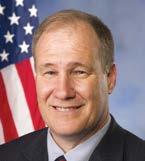


District 3: Benton, Pontotoc, and Union counties
Address: 1506 Moss Hill Drive New Albany, MS 38652 Years in Legislature: 4
District 8: Calhoun, Chickasaw, Lee, Pontotoc, and Yalobusha counties
Address: P.O. Box 8 Bruce, MS 38915
Years in Legislature: 4
District 15: Pontotoc County


Address: P.O. Drawer 300 Pontotoc, MS 38863
Years in Legislature: 15
Rep. Jonathan “Jon”Lancaster

District 22: Chickasaw and Pontotoc counties

Address: 463 CR 85 Houston, MS 38851

Years in Legislature: 4
District 14: Union County
Address: 1314 South Central Avenue New Albany, MS 38652
Years in Legislature: 4

District 9: Lafayette and Panola counties
Address: 113 Sivley Street Oxford, MS 38655



Years in Legislature: 4




District 13: Benton, Lafayette, Marshall, and Union counties
Address: 1322 Hwy. 5 Hickory Flat, MS 38633
Years in Legislature: 11

District 23: Calhoun, Grenada, Lafayette, and Webster counties


George (PEPA Retiree) and Martha Stegall
INGREDIENTS
1 pound ground beef
2 cans corn
2 cans hominy
2 cans kidney beans
2 packages onion soup mix
Brown beef in large Dutch oven. Drain fat. Add remaining ingredients and simmer two to six hours.
Note: Best cooked in cast iron.
Mark (PEPA Retiree) and Jenna Patterson
INGREDIENTS
1 can cream-style corn
2 cans potato soup
1 pound sausage, cooked
1 can whole kernel corn
1 pint half-and-half
Place all ingredients in a crock pot and cook on high for a couple of hours or on low for 6-7 hours.
Curtis (PEPA Retiree) and Seretha Gregory
INGREDIENTS
1 whole chicken
1 can English peas
8 potatoes
1 onion
1 can corn
1 can carrots
1 can evaporated milk

Boil chicken until meat comes o the bone. Mix all canned vegetables. Chop onion. Peel and slice potatoes. Mix onion and potatoes with vegetables together in a pot. Add chicken. Keep on low heat.
Betty Armstrong, PEPA Retiree
INGREDIENTS
1 can tomato soup
1 can chili with beans
1 can diced tomatoes
1 can whole kernel corn
1 can vegetable beef soup
1 can chili without beans
1 can Veg-All, large
1 can Ro-tel tomatoes
Mix all ingredients. Do not drain anything. Can put in crock pot and simmer for hours. Can add ground meat, chicken, or stew meat. Cornbread is best with this.


For more information, call 601-947-4211 or 228-497-1313. SRE is an equal opportunity employer and provider.


Just over one year ago on Dec. 13, 2021, our fiber subsidiary, Singing River Connect, connected its first high-speed internet customer. The last 12 months have been exciting as we’ve seen subscriber growth emerge to more than 2,300 in this short timeframe. Singing River Connect is providing subscribers with the fastest, most reliable internet service being o ered in the area. Like our electric business, customer service is a priority.
Seeing the reactions of Singing River Connect’s first subscribers further indicates the importance of this vital service. For many, highspeed fiber internet brings significant change to subscriber families’ lives as technology requirements become more of a necessity. As we move forward at a pace of building 25-30 miles


of fiber lines per week, we ask for your patience as we continue this journey. More than 1,250 miles of fiberoptic lines have been installed, and we are aggressively moving forward in an attempt to build more than 7,000 miles at the project’s end.
In addition, Singing River Electric should have its first SCADA (supervisory control and data acquisition) project up and running by the end of this month. As mentioned in past articles, this SCADA system will allow for real-time monitoring and control of equipment located in our 45 substations and will aid in member outage response.
On behalf of our employees and our board, I wish you a safe and blessed new year.
Robbins Energy Services Representative robbins@singingriver.com



Changing out your light bulbs and keeping heat inside your house for warmth are two great ways to start 2023 with energy savings in mind.
Light emitting diode or LED bulbs are the most energy-e cient choice for your home or business. Manufactured to replace traditional incandescent and compact florescent/CFL bulbs, LEDs last around 15 times longer and save $80-$100 in electricity costs during the bulb’s lifespan. When choosing an LED bulb, look for an Energy Star certified bulb and consider the brightness, color and size that best fits your room’s needs.
Keep your home warm with a few di erent energy saving e orts. Switch your ceiling fan to a clockwise rotation and run it at the lowest speed to bring down the warm air that has risen to the ceiling. Open your curtains and blinds during the day to let the sunshine in and add some extra warmth to your home – for free! An overlooked source of heat loss are exhaust fans, often used in bathrooms and over stovetops. Use exhaust fans sparingly and turn them o when their job is done to make sure warmth isn’t being pulled out of your home needlessly.
Candidates seeking election to the board of directors for Singing River Electric Cooperative must visit Singing River Electric’s Lucedale o ce located at 11187 Old 63 South and obtain a director qualification packet. The forms and petitions included must be completed, and the packet returned by the close of business on the last business day of February (Tuesday, February 28, 2023).
As mentioned in our CEO column this month, this past December 13, 2021, marked the one-year anniversary of Singing River Connect (SR Connect) lighting up its first fiber subscriber.





So much work proceeded that day, beginning with the Mississippi Broadband Enabling Act legislation passing in January 2019 and a Singing River Electric (SRE) member survey completed the same year. SRE held a drive-in membership vote on October 9, 2020, where 96% of the members participating voted to amend the co-op’s Certificate of Incorporation allowing SRE to o er both electric and fiber services.

The name and logo for SRE’s new fiber a liate, SR Connect, was announced at the annual membership meeting in June 2021, and members began visiting singingriverconnect.com to “express an interest” in fiber internet service.












Singing River Electric employees currently work in roles to maintain and serve both electric and fiber facilities and members. With the assistance of several contract crews, more than 1,250 miles of fiberoptic lines have been installed in our quest to build out the fiber system. The fiber lines follow the power lines, and we are opening up new fiber areas and communities each month. We work hard to bring unsurpassed speeds and exceptional broadband service to all of our fiber internet subscribers.
For more information, visit singingriverconnect.com/signup














inging River Electric participated in the Pathways2Possibilities (P2P) Career Expo on November 16-17 at the Mississippi Coast Convention Center in Biloxi.

P2P offers local 8th graders insight into many career opportunities and provides our employees a way to mentor and give back. Making up the Energy Pathway were Singing River Electric, Cooperative Energy, Coast Electric, Mississippi Power, and Chevron.

Students enjoyed a true hands-on experience where they performed tasks like climbing a power pole and framing a pole—all while wearing rubber lineman gloves. They also had the opportunity to role-play at the member service representative booth and learn about fiber internet from our engineers at the Singing River Connect booth.

“This is a unique opportunity for both the students and our employees. Our employees really enjoy interacting with the students and explaining the many career opportunities available in the Energy Pathway,” said Public Relations Assistant Stephanie Chisholm, who coordinated the event for SRE.
The P2P Gulf Coast event hosts 8th graders from 10 different lower Mississippi counties and introduces them to careers in energy, aerospace, agriculture, finance, hospitality, information technology, construction, and other industries.

P2P now serves to educate eighth graders in Mississippi, Tennessee and South Carolina. It was started by members of the Jackson County Chamber of Commerce Education Issues Manager Group. They attended a career expo in Alabama called Worlds of Opportunity (WOO) and decided to bring this career fair to the Mississippi Gulf Coast.
P2P debuted on November 13-14, 2013, covering the 133,000 square-feet of the Biloxi Coast Convention Center. Singing River Electric began its P2P participation at this event. It was attended by 6,000 8th graders and became an instant success expanding to the Tupelo, Delta and northwest Mississippi areas. This was followed by career fairs in Tennessee and North Carolina.
For more information, visit pathways2possibilities.org.
Inside the Energy Pathway, students learned about the importance of customer service through interactive role-play, had their picture made from inside a lineman’s bucket, and experienced climbing a pole in lineman’s gear.The Electric Cooperatives of Mississippi o ers a free, easy-touse mobile app, which provides information on Mississippi’s state and federal elected o cials. Look for “Mississippi Legislative Roster” in the Apple App Store. An Android version is also available through Google Play.




Sen. Dennis DeBar, Jr. District 43: George, Greene and Wayne counties Address: P.O. Box 1090 Leakesville, MS 39451 Years in Legislature: 12



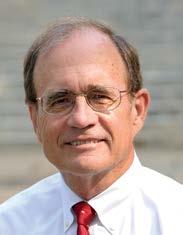




Address: 901 Beach Blvd. Pascagoula, MS 39567
Years in Legislature: 12
Years in Legislature: 4
Sen. Jeremy England District 51: Jackson County Address: P.O. Box 6363 Vancleave, MS 39565 Years in Legislature: 4












Sen.

District 52: Jackson County Address: P.O. Box 922 Pascagoula, MS 39568 Years in Legislature: 12





Years in Legislature: 12

Address: P.O. Box 311 Escatawpa, MS 39562 Years in Legislature: 11
 Brice Wiggins
Rep. Manly Barton District 109: George and Jackson counties Address: 7905 Pecan Ridge Dr. Moss Point, MS 39562
Rep. Henry B. “Hank” Zuber III District 113: Jackson County Address: 503 Minor Lane Ocean Springs, MS 39564 Years in Legislature: 24
Rep. Jeramey D. Anderson District 110: Jackson County
Rep. Charles Busby
District 111: Jackson County
Rep. Je rey S. Guice District 114: Harrison and Jackson counties Address: 1208 Iola Rd. Ocean Springs, MS 39564
Brice Wiggins
Rep. Manly Barton District 109: George and Jackson counties Address: 7905 Pecan Ridge Dr. Moss Point, MS 39562
Rep. Henry B. “Hank” Zuber III District 113: Jackson County Address: 503 Minor Lane Ocean Springs, MS 39564 Years in Legislature: 24
Rep. Jeramey D. Anderson District 110: Jackson County
Rep. Charles Busby
District 111: Jackson County
Rep. Je rey S. Guice District 114: Harrison and Jackson counties Address: 1208 Iola Rd. Ocean Springs, MS 39564









While we look forward to a prosperous 2023, it’s also important to look back at the year behind us and reflect on our challenges and successes. We all know the challenges of inflation, supply chain disruptions, acceleration of interest rates, and higher demand for almost all the supplies and necessities we need.


That all translates into higher costs for most everyday items. For us here at your cooperative, getting transformers, wiring, poles, and equipment is more complicated and expensive, with waiting times extending for months. Please don’t get me talking about trying to purchase a bucket truck.



Even with all these challenges, Southern Pine is still financially sound. We can still provide safe, reliable, and a ordable electricity. Doing this requires careful planning and smart decisions to make sure we do the right things at the right time. The employees and board of directors of Southern Pine have done a tremendous job in planning and implementing those plans.
Here are a few updates about our work this year. With over 10,500 miles of energized lines spanning 11 counties, vegetation management is a continuous cycle. Over 2,400 miles of rights-of-way were trimmed and bushhogged in 2022. This is an incredible amount of work that requires a lot of planning and oversight. I thank our vegetation management specialist and right-of-way coordinators for their hard work.
Another area that we have worked hard to improve is our telephone system. The call center, which opened in the spring of 2022, has been an enormous success and has dramatically improved call wait times.

We also added an outage text option and updated our website, including an online chat feature. The latest addition to our member service options is the new MyPower app. I hope everyone will download the app. Lastly, we’ve begun installing payment kiosks at our district o ces which will make paying your bill even more convenient.
We’ve addressed some of our most aging infrastructure needs by completing upgrades to the Martinville Substation, upgrading the relays at the North Hattiesburg Substation, and completing the re-phase projects for the Magee and Stringer areas. These updates improve reliability.
It has been a challenging but successful year here at Southern Pine, and I thank our employees for all their contributions. We’ve accomplished great things while our crews battled one thunderstorm after another for about four straight months during the year. I’ve said it many times, our employees are our greatest asset. I thank them for everything they do to bring power to our members. We are honored to continue serving you in 2023.
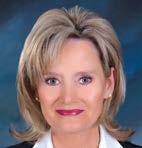









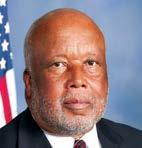




We use Facebook, Twitter and LinkedIn to post information on how to become more energy efficient, safety tips and to inform members about special events throughout the year. During weatherrelated events, these sites provide storm preparation details and outage information.

However, social media is not the most efficient means to report an outage, as it is not monitored 24-7.






MyPower is an online tool that allows members to check energy use, view previous bills and set a monthly electricity-use budget. The site also provides an easy-to-use method for reporting an outage and allows you to email questions or comments to Southern Pine.
To sign up for MyPower, visit southernpine.coop and click on the MyPower icon in the center of the home page.






for a job well done to all our representatives and senators who represent constituents residing in our service area!Sen. Tyler McCaughn District 31: Lauderdale, Newton, and Scott counties Sen. Albert Butler Sr. District 36: Claiborne, Copiah, Hinds, and Jefferson counties Sen. Josh Harkins District 20: Rankin County
Southern Pine Electric salutes Mississippi’s senators and representatives who represent our state in Washington, D.C. and at ourstate capitol
in Jackson. We appreciate their dedication and willingness to serve in the spirit of public service to help shape the future of our state.
























Southern Pine Electric held its annual membership meeting on Nov. 10, 2022, at 2 p.m. Before the meeting, Southern Pine employees welcomed members at booths focused on electric safety, conservation, and more.


The first meeting since 2019 to be held in person was a long-awaited event for the members of Southern Pine. Members had a chance to see a safety demonstration, Cooperative Energy’s drone program, enjoy a fried catfish lunch, and visit member spotlight booths that highlighted members and their products from each district. The Cotton Blossom Singers from Piney Woods School kicked off the meeting with a beautiful vocal performance.
Chris Rhodes, president and CEO of Southern Pine Electric, opened the meeting by giving a recap of 2022 challenges and accomplishments and introducing special guests. Michael Watson, Secretary of State, was the guest speaker, followed by Public Service Commissioner Brent Bailey.
“The very reason we exist is because of our members,” said Rhodes. “We appreciate our members taking time from their busy schedules to attend the meeting and show support for their co-op. Without members, there is no Southern Pine.”
Over 1,000 members attended the meeting to cast their ballots for four directors. Billy Parish of Jefferson Davis County, Blaine Eaton of Smith County, Mims Berry of Lawrence County, and Dean Kirby of Rankin County were all elected to serve three-year terms.












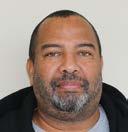


















Southwest Electric salutes Mississippi’s senators and representatives who represent our state in Washington, D.C. and at our state capitol in Jackson. We appreciate their dedication and willingness to serve in the spirit of public service to help shape the future of our state.

1 2 3 4
for a job well done to all our representatives and senators who represent constituents residing in our service area.
ROGER WICKER


555 Dirksen Senate Office Building Washington, D.C. 20510
CINDY HYDE-SMITH

702 Hart Senate Office Building Washington, D.C. 20510

Second District 2466 Rayburn House Office Building Washington, D.C. 20515

Third District 450 Cannon House Office Building Washington, D.C. 20515
 TATE REEVES Governor DELBERT HOSEMANN Lieutenant Governor
TATE REEVES Governor DELBERT HOSEMANN Lieutenant Governor






Sen.
Sen.
Sen.





Years in Legislature: 14
Years in Legislature: 8



Years in Legislature: 14

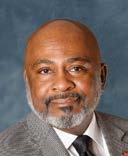





District
Years
Years
District

Years in Legislature: 31

Years
Years
Years
Years in Legislature: 3
Years






Learn how you can take control of your energy bills with Southwest Electric’s personalized energy analysis and energy calculators.
Now available to Southwest Electric Members:

Conduct a Virtual Energy Assessment of your home. It takes just a few minutes to profile your home and get savings recommendations.
Would you like to learn some basics about electricity and energy use? Use our resources to learn more about electricity.
Try comparing the operating cost of a microwave or small countertop cooker to a conventional oven. You might just be surprised.
How many televisions do you have? Many homes have more than one. Compare operating costs of di erent size and types of televisions.

What would happen if you replaced all of your incandescent light bulbs in your house with LEDs. You might be surprised at how much money you could save monthly.
Visit southwestelectric.coop/energy-calculators/ and learn more ways to save.










Many of us are so connected to our phones, tablets and laptops that we panic when their battery nears the dreaded 0% mark. We want our device batteries to perform well for as long as possible. But taking care of them can conflict with why we have our electronics in the first place. The point isn’t to fret about battery life, it’s to read and send e-mails, scroll on social media, take photos, and countless other pursuits. If you ever find yourself fretting over your device’s power levels, here are a few tips on striking the right balance between battery health and how you work and play.
Keep your battery about 40% to 80% charged.
There’s a lot of reasonable advice around the internet to keep your phone charged between 20% and 80%, or between 40% and 80%. To understand those recommendations — and why you might want to either follow them or ignore them — it helps to understand how rechargeable batteries work.
Up until about 20 years ago, batteries benefitted from occasional “deep discharges”—running the battery down until the device shuts off. But because of different materials used in batteries today, that’s not true anymore.





Rechargeable batteries work by containing two different materials that produce electricity when particles flow from one to the other. They flow the other direction when being recharged. That process will degrade any battery over time. Keeping both sides of the battery in balance, with the device charged at about 50%, will put the least amount of stress on the battery and make it last longer.
But that’s unrealistic — no one’s going to keep their phone half-charged all the time. So, the experts try to make it easier by recommending 40% to 80% or 20% to 80%.
Overnight charging can add stress to some batteries. Charging your device up to 100% or letting it drain to 0% until it shuts down does put extra stress on the battery and can shorten its life. That’s why it can make sense to charge your devices occasionally throughout the day rather than keeping them plugged in while you sleep.

Many of us are so connected to our phones, tablets and laptops that we panic when their battery nears the dreaded 0% mark.






One absolute in battery care is don’t let your device get warmer than 95 degrees. Keep it out of the sun, and never leave it in a hot vehicle. If the device does get hot, don’t go to the other extreme and put it in the freezer. Just place it in the shade or take the cover off for a while.
It sounds simple, but one of the easiest ways to put less stress on the battery is to use less power. You can close energy-draining apps and functions when you’re not using them, and you can activate energy-saving settings like putting the device to sleep sooner. Another easy way to reduce battery use is to activate the “airplane mode” button every now and then. You may be inconvenienced by a temporary pause on receiving e-mails or phone calls, but it might help you focus on that movie you’re watching, the trail you’re hiking, or the conversation with your dinner companions.


Twin County Electric Power Association salutes Mississippi’s senators and representatives who represent our state in Washington, D.C., and at our state capitol in Jackson. We appreciate their dedication and willingness to serve in the spirit of public service to help shape the future of our state.





555
Senate Office Building Washington, D.C. 20510
702 Hart Senate Office Building Washington, D.C. 20510
Second District 2466 Rayburn House Office Building Washington, D.C. 20515
TATE REEVES Governor DELBERT HOSEMANN Lieutenant Governor CINDY HYDE-SMITH ROGER WICKER





















 Sen. David L. Jordan District 24: Grenada, Holmes, Humphreys, Leflore, and Tallahatchie counties
Sen. Derrick T. Simmons District 12: Bolivar, Coahoma, and Washington counties
Rep. M. Kevin Horan District 34: Carroll, Grenada, Holmes, Leflore, and Tallahatchie counties
Rep. Rufus E. Straughter District 51: Humphreys, Sharkey, and Yazoo counties
Sen. Sarita Simmons District 13: Bolivar, Sunflower, and Tallahatchie counties
Rep. Oscar Denton District 55: Warren County
Rep. John W. Hines Sr. District 50: Bolivar, Issaquena, and Washington counties
Rep. Kevin Ford District 54: Issaquena, Warren, and Yazoo counties
Rep. Willie L. Bailey District 49: Washington County
Sen. Joseph Thomas District 22: Bolivar, Humphreys, Madison, Sharkey, Washington, and Yazoo counties
Sen. David L. Jordan District 24: Grenada, Holmes, Humphreys, Leflore, and Tallahatchie counties
Sen. Derrick T. Simmons District 12: Bolivar, Coahoma, and Washington counties
Rep. M. Kevin Horan District 34: Carroll, Grenada, Holmes, Leflore, and Tallahatchie counties
Rep. Rufus E. Straughter District 51: Humphreys, Sharkey, and Yazoo counties
Sen. Sarita Simmons District 13: Bolivar, Sunflower, and Tallahatchie counties
Rep. Oscar Denton District 55: Warren County
Rep. John W. Hines Sr. District 50: Bolivar, Issaquena, and Washington counties
Rep. Kevin Ford District 54: Issaquena, Warren, and Yazoo counties
Rep. Willie L. Bailey District 49: Washington County
Sen. Joseph Thomas District 22: Bolivar, Humphreys, Madison, Sharkey, Washington, and Yazoo counties
Last year saw a record increase in electric vehicle (EV) sales, and experts are predicting that by 2035, many major vehicle manufacturers will only produce electric models.




A 2021 study by the Department of Energy showed that increased electrification, or replacement of direct fossil fuel use with electricity, would account for a 38% increase in electricity demand by 2050 — and EVs will play a major role in this increased electrification.
Electric cooperatives are currently identifying ways to manage this new pattern of electricity use, though exact strategies will vary based on each utility’s unique needs. Analyzing energy load patterns or identifying where and when the local grid has spikes in demand can provide electric co-ops with data on where to place higher-capacity transformers. This analysis can also provide a picture of overall energy use and patterns to help forecast energy consumption for the future. Planning system maintenance and upgrades are also part of that long-range forecasting; however, this has been recently complicated by supply-chain issues with transformers, with wait times that are upwards of one year.

EV owners can play a role in reducing energy costs and system stress associated with charging. Check with your local electric co-op to see if they o er an EV charging rate. Typically, an EV rate incentivizes charging during the night, when electricity demand and wholesale energy rates are lower. Charging at night is also a great way to ease demand in your neighborhood, even without a special EV rate.
The need for more electricity will have a major impact on the nation’s grid, which means power supply and grid infrastructure must be carefully planned to accommodate the increased need for electricity.




EV charging presents new challenges in maintaining the electric grid. Fully charging an EV battery requires the same amount of electricity needed to power a home during peak energy use times. However, EV charging is a concentrated pull of energy over an extended period, which can add stress to the local power grid by increasing the amount of electricity a utility has to provide. Additionally, the neighborhood transformer needs adequate capacity to handle the increased load. EV charging can shorten the lifespan of transformers by straining and overloading their capacity if they are not matched to a neighborhood’s energy needs.
Another potential change on the horizon is a new energy peak time. EV drivers that plug-in to charge as soon as they return home from work would create even more electricity demand during this busy time of day. But if EV drivers use a timer to schedule charging at night, the electricity demand could be spread over a longer period to reduce stress on the grid. This would be especially beneficial for neighborhoods with multiple EV drivers.


EVs are only expected to increase in number. Electric co-ops and EV owners both have roles to play in accommodating increased demand. If you own an EV, let your electric co-op know so they can better plan energy demand for you and your neighbors.









 by Paul Wesslund
by Paul Wesslund
Many of us are so connected to our phones, tablets and laptops that we panic when their battery nears the dreaded 0% mark. We want our device batteries to perform well for as long as possible. But taking care of them can conflict with why we have our electronics in the first place. The point isn’t to fret about battery life, it’s to read and send e-mails, scroll on social media, take photos, and countless other pursuits. If you ever find yourself fretting over your device’s power levels, here are a few tips on striking the right balance between battery health and how you work and play.
Keep your battery about 40% to 80% charged.
There’s a lot of reasonable advice around the internet to keep your phone charged between 20% and 80%, or between 40% and 80%. To understand those recommendations — and why you might want to either follow them or ignore them — it helps to understand how rechargeable batteries work.
Up until about 20 years ago, batteries benefitted from occasional “deep discharges”—running the battery down until the device shuts off. But because of different materials used in batteries today, that’s not true anymore.
Rechargeable batteries work by containing two different materials that produce electricity when particles flow from one to the other. They flow the other direction when being recharged. That process will degrade any battery over time. Keeping both sides of the battery in balance, with the device charged at about 50%, will put the least amount of stress on the battery and make it last longer.
But that’s unrealistic — no one’s going to keep their phone half-charged all the time. So, the experts try to make it easier by recommending 40% to 80% or 20% to 80%.
Overnight charging can add stress to some batteries.
Charging your device up to 100% or letting it drain to 0% until it shuts down does put extra stress on the battery and can shorten its life. That’s why it can make sense to charge your devices occasionally throughout the day rather than keeping them plugged in while you sleep.

Many of us are so connected to our phones, tablets and laptops that we panic when their battery nears the dreaded 0% mark.







One absolute in battery care is don’t let your device get warmer than 95 degrees. Keep it out of the sun, and never leave it in a hot vehicle. If the device does get hot, don’t go to the other extreme and put it in the freezer. Just place it in the shade or take the cover off for a while.



It sounds simple, but one of the easiest ways to put less stress on the battery is to use less power. You can close energy-draining apps and functions when you’re not using them, and you can activate energy-saving settings like putting the device to sleep sooner. Another easy way to reduce battery use is to activate the “airplane mode” button every now and then. You may be inconvenienced by a temporary pause on receiving e-mails or phone calls, but it might help you focus on that movie you’re watching, the trail you’re hiking, or the conversation with your dinner companions.















Address: 374 North West St. Canton, MS 39046
Years in Legislature: 20
Address: 820 Prentiss Ave. Yazoo City, MS 39194

Years in Legislature: 4
Sen. W.

III District 23: Issaquena, Warren, and Yazoo counties Address: 1201 Cherry St. Vicksburg, MS 39183 Years in Legislature: 16

Rep.
District 27: Attala, Leake, Madison, and Yazoo counties
Address: P.O. Box 265 Carthage, MS 39051
Years in Legislature: 8
Rep. Kevin Ford


District 54: Issaquenna, Warren, and Yazoo counties
Address: 206 Willow Way Vicksburg, MS 39183 Years in Legislature: 7



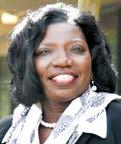
District 47: Attala, Holmes, and Yazoo counties
Address: 271 Clark Rd. Pickens, MS 39146 Years in Legislature: 20
Rep.
District 48: Attala, Carroll, Holmes, and Leake counties Address: P.O. Box 246 West, MS 39192 Years in Legislature: 12
Address: 504 Bowie Lane Greenwood, MS 38930 Years in Legislature: 31


Rep. Oscar Denton District 55: Warren County Address: 5024 Rollingwood Estates Dr. Vicksburg, MS 39180 Years in Legislature: 11
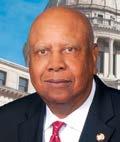



Rep.
Address: P.O. Box 200 Raymond, MS 39154 Years in Legislature: 4

Address: 107 Van Buren St. Belzoni, MS 39038 Years in Legislature: 28
 Kenneth Walker
Rep. Bryant W. Clark
Stephanie Foster District 63: Hinds, Warren, and Yazoo counties
Jason White
Rep. Rufus Straughter District 51: Humphreys, Sharkey, and Yazoo counties
Briggs Hopson
Sen. Barbara Blackmon
District 21: Attala, Holmes, Leake, Madison, and Yazoo counties
Sen. David Jordan District 24: Grenada, Holmes, Humphreys, Leflore, and Tallahatchie counties
Sen. Joseph Thomas District 22: Bolivar, Humphreys, Madison, Sharkey, Washington, and Yazoo counties
Kenneth Walker
Rep. Bryant W. Clark
Stephanie Foster District 63: Hinds, Warren, and Yazoo counties
Jason White
Rep. Rufus Straughter District 51: Humphreys, Sharkey, and Yazoo counties
Briggs Hopson
Sen. Barbara Blackmon
District 21: Attala, Holmes, Leake, Madison, and Yazoo counties
Sen. David Jordan District 24: Grenada, Holmes, Humphreys, Leflore, and Tallahatchie counties
Sen. Joseph Thomas District 22: Bolivar, Humphreys, Madison, Sharkey, Washington, and Yazoo counties
“Smart” was originally an acronym for self-monitoring analysis and reporting technology. This refers to technology that can be programmed for automation or controlled remotely using Bluetooth or Wi-Fi from a smart phone app or online. A smart home is one with automated control of appliances and systems, such as lighting fixtures, and heating and cooling systems.
There are multiple reasons people choose to automate their homes, including convenience, energy e ciency, and security. Just because a


Because heating and cooling account for the most energy use in a home, these systems are the best place to look for energy savings.
Smart thermostats o er features and functionality that can help you save energy and money without thinking about it, including learning preferences and automatically setting temperatures. Geofencing is a feature that uses your phone’s location to gauge your distance from home and adjusts the temperature accordingly.
Smart thermostats also let you control the thermostat from anywhere with an internet connection, and automatic software updates use new algorithms to maximize energy savings. Features vary by product, so be sure to choose the one that’s right for you.
Smart window coverings are increasing in popularity and availability. They can help save energy both in the winter and summer by operating based on the temperature of the room or a preset schedule.
Smart lighting can help you remotely control lights in your home, based on occupancy or a preset schedule. Lighting also can be paired with home security systems.
You can use smart outlets and power strips to control devices from outside the home, or manage use based on load. For example, you can plug your computer and devices into a load-sensing power strip that turns o peripheral devices, such as monitors and printers, when your computer is not in use.
You’ve probably heard the term “smart home” a lot in recent years. If you’re curious about what makes a home smart, how it can boost energy e ciency and help you save money, you have come to the right place.
product is smart, don’t assume it’s energy e cient. Added connectivity, lights, and touchscreens can actually increase your energy use. Always look for the ENERGY STAR® logo when shopping, which certifies the products meet standards for energy e ciency.
Energy savings typically come from automating the systems, devices, and appliances in your home to use less energy or use energy when it costs less. Here are a few ways you can start implementing smart technology at home.
There are many options for smart appliances in the heart of the home. Smart refrigerators o er energy-saving features, such as notifications when the door is left open. Digital screens that show the contents to keep you from opening the door.
Smart ovens let you preheat when you are on your way home or check if you forgot to turn o the oven when you are away. Toasters, range hoods, microwaves, and countertop ice makers are among the growing list of additional smart kitchen gadgets available.
More smart home technologies are on the horizon, bringing more ways to operate the various systems, devices, and appliances in your home.

As you think about ways to make your home smarter, remember to look for products that use the same smart home apps, which will make these new technologies even easier to manage.
Many people use Wi-Fi to stream TV shows and movies. Smart TVs with built-in streaming functionality o er the most e cient way to stream content. If your TV cannot connect to the internet for streaming, opt for a streaming media player, such as Roku or Apple TV. They use 15 times less energy than a gaming console to stream the same shows and movies.
Jan. 3, 2023, happens to be the first Tuesday after the first Monday of January and thus, the start of the Mississippi Legislative session. For the next 90 days, my government relations team will be at the state capitol monitoring legislation and educating members of the Mississippi House and Senate, regarding the potential e ect such outcomes could have on Mississippi’s 26 electric cooperatives and their members. It just so happens that 2023 is an election year for Mississippi.
I know some of you are thinking, “Didn’t we just have an election in November?” Yes, we did, but this is Mississippi and in Mississippi, it is always an election year for some o ce! In 2022 you voted for the folks you send to Washington, D.C. In 2023, you will vote for your statewide o cials, House and Senate members, county sheri s, circuit and chancery clerks, county supervisors, right on down to your local dogcatcher. Ok, maybe not the dogcatcher, but you understand my meaning. All the folks who touch your life daily and make decisions directly a ecting you will be on the ballot.
These elections are important for determining the future course of Mississippi. Therefore, not only do we want to encourage our cooperative membership to vote, but we also want to help you become a better-informed voter. Throughout this year we will be doing interviews, both written and video, with current and potential state leaders, so you, as a voter, can understand why this person wants the job and what they intend to do should they be elected.












Check out our easy-to-use mobile app of Mississippi’s state and federal elected o cials. Look for “Mississippi Legislative Roster” in the Apple App store. An Android version is also available through Google Play.
I know some of you are Republicans, while others are Democrats, and some vote the way my father did, “I vote for the man, not the party.” That’s fine with us. We are going to be, well I cannot say fair and balanced, someone else owns that line, but let’s just say we are going to give equal opportunity to all thoughts and ideas, regardless of party, so you, as a co-op member and voter, can make an informed decision on Election Day. (Whoa, flashback to my days of practicing law!)

“One of the penalties for refusing to participate in politics is that you end up being governed by your inferiors,” is a quote often attributed to Plato. As someone who has run for and won public o ce, I understand that not everyone has the desire or attributes to be a politician. But voting is a form of participation, and every qualified man and woman in Mississippi should not only cast their vote, but care enough to understand who they are voting for and why.
My goal in 2023 is to make that easier for you to do.
Enjoy our January issue.
by Michael Callahan
True to the heart of the music as it rings in the earth’s atmosphere.
The melody blues moving into the movement with an unforgettable rhythm and blues.

Bringing the flow of love as it lifts the soul of the people.
As it’s dashing by, they will never forget My Mississippi.
What’s Mississippi to you?
What do you treasure most about life in our state? Send your brief thoughts to Today in Mississippi, news@ecm.coop or mail to P.O. Box 3300, Ridgeland, MS 39158

Submit your beautiful digital photo of life in Mississippi to Today in Mississippi, news@ecm.coop






